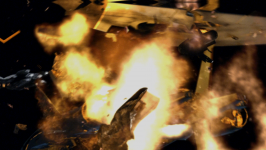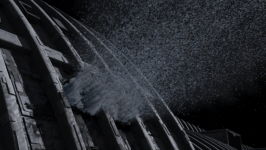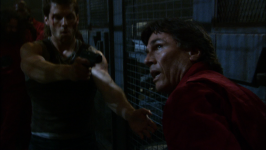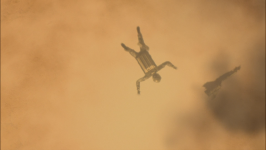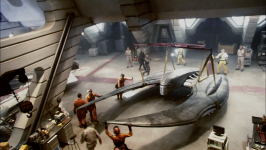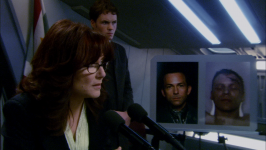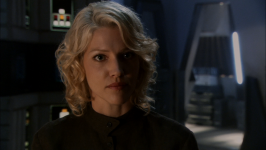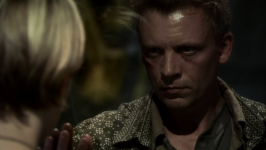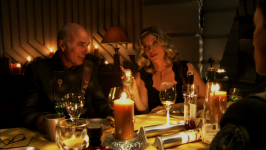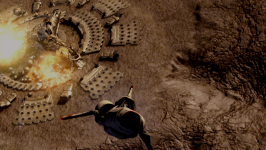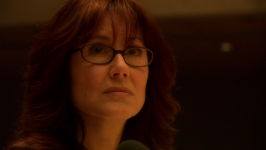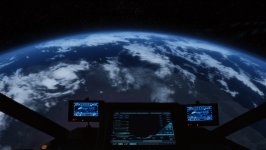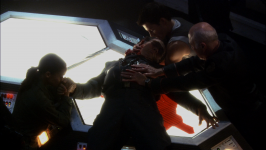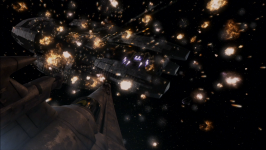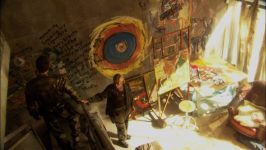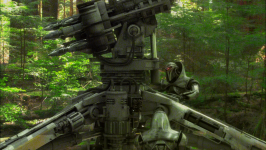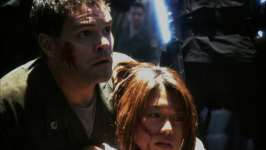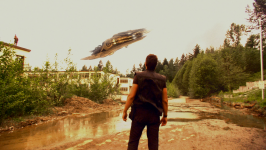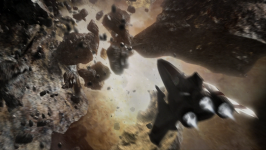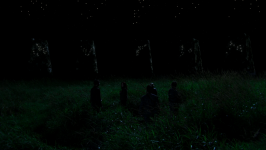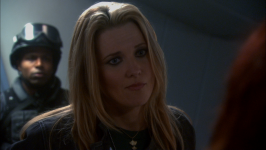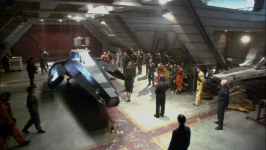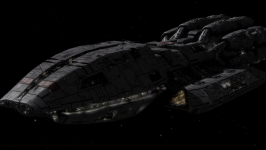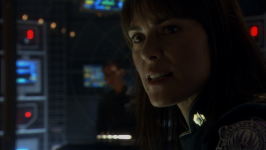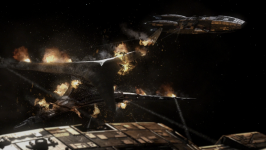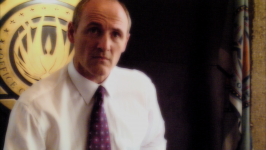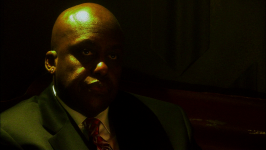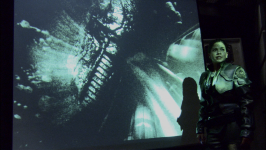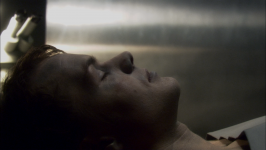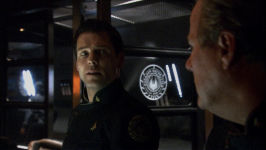Battlestar Galactica — 1x01 — 33
Synopsis
In the wake of the Cylon sneak attack, the ragtag fleet of human survivors is forced to play a deadly game of cat-and-mouse with their pursuers. Every 33 minutes, they make a jump to a new location. And every 33 minutes, the Cylons manage to find them. The pilots are on the brink of exhaustion, relying on artificial stimulants to keep fighting, and the civilians are beginning to doubt the leadership of Commander Adama and President Roslin.
When the Olympic Carrier, a commercial passenger ship, fails to make a jump and then later mysteriously turns up unharmed, Adama fears it has been infiltrated by the Cylons. His choice: destroy it and the 1,300 souls it might still be carrying, or risk the annihilation of the entire fleet. Adama is not alone in fearing the mystery ship. Baltar, who remains mentally connected with his beautiful and deadly Cylon companion Number Six, panics when he learns one of the ship's passengers has information about a traitor in the president's inner circle.
Meanwhile, down on the ruined, Cylon-occupied colony of Caprica, Helo is on the run from another group of Cylons. He's going to need help to make it back to the Galactica, but there's no help in sight...
Remarkable scenes
- Cally: "Why do the Cylons come every 33 minutes? Why isn't it 34 or 35?" Tyrol: "Cally." Cally: "What?" Tyrol: "Shut up."
- The hallway with seemingly endless amounts of photos of missing people.
- Six: "Procreation is one of god's commandments."
- Roslin to Billy regarding Baltar: "He's a strange one, isn't he?"
- Helo blowing up some Cylons.
- The Olympic Carrier charging toward the fleet.
- The Cylons appearing in the midst of the Olympic Carrier situation.
- Baltar's simultaneous repentance with Roslin's order to take out the Olympic Carrier.
- Apollo and Starbuck destroying the Olympic Carrier.
- Caprica Boomer shooting a Six model Cylon.
- Billy informing Roslin of the birth of a baby within the fleet.
Review
The miniseries ends with something of a major cliffhanger revealing Boomer to be a Cylon and off the colonials go in a search for a fictitious Earth. Six said in the miniseries, "your escape is a temporary one at best," and this episode is true to her words. Immediately, right at the beginning of 33, we know some very bad things have been happening to the colonials. The Cylons had found them after only a short time and had been chasing them for nearly a week straight, jumping to their position every 33 minutes.
What results is a story about an exhausted fleet fighting for their survival, jumping to a new location every 33 minutes, hoping they'll at some point lose the Cylons. Woven into the story are two other plot threads. One of them deals with Helo, who was left on Caprica during the miniseries and what he's doing to survive. We don't get to see a lot of Helo, but it seems clear the Cylons are herding him, or setting him up for something. He's manipulated into finding another copy of Boomer, who he thinks has returned to Caprica to rescue him. But why the Cylons are manipulating Helo in this way is not clear.
The much more interesting and important story centers around Baltar, the Cylon god, Six, and the Olympic Carrier. The story leaves it wonderfully ambiguous as to whether or not these concepts are all connected or whether they are "coincidental, serendipitous events" as Baltar put it. But one thing is for sure, the Cylons are deeply religious in the monotheistic sense, and the Six in Baltar's head, whatever she is, wants to convert Baltar into believing in the Cylon god. Additionally, "procreation is one of god's commandments." Six wants to, somehow, have a baby with Baltar. Whether or not this is even possible and how it could be accomplished is unclear, but the Cylon religion and the Cylon desire for procreation appear to be major plot points to be developed in season 1.
Wrapped around these concepts is of course the very real story of sacrificing the few to save the many, something the miniseries did extremely well. It's done nicely here too, but I'm irked that there was a sort of desensitizing done to the destruction of the Olympic Carrier. "It's okay to destroy it, it's got nobody aboard!" Making the Olympic Carrier a direct threat to the fleet using nukes was a great idea, but there should have absolutely most definitely been people on board that ship. Not only would the danger still be high from the nukes in this case, but the heart wrenching feeling of murdering the few to save the many would have been even more apparent, and it would have given the episode much more of an emotional punch.
Overall, 33 is an incredibly strong start to the season.
Battlestar Galactica — 1x02 — Water
Synopsis
Lt. Sharon Valerii wakes up soaking wet in the tool room with an explosive charge in her duffel bag. Shortly afterward, a mysterious explosion destroys all the port-side water tanks on Galactica, creating a crisis for the entire fleet. Sharon can't remember a thing, but all the evidence points to her as a saboteur. She confesses her concern to Chief Tyrol, but he can't believe she's responsible.
As water riots erupt, Commander Adama and President Roslin struggle to contain the crisis, putting all the ships on limited rations and assigning Baltar the job of rooting out any Cylons who may have infiltrated the crew.
Meanwhile, on Cylon-occupied Caprica, another avatar of Sharon struggles to save Helo, her stranded Raptor crewmate.
Remarkable scenes
- Tigh rationing what's left of his alcohol.
- Roslin: "The military, they do love their protocol." Billy: "Well I'm sure if they knew you didn't like it they'd be willing to--" Roslin: "No, let Adama sound the trumpets. I think it makes him feel more comfortable and if he feels more comfortable he'll be a little easier to deal with." Billy: "That's smart." Roslin: "No, it's not smart. It's politics."
- Roslin: "I think I'm going to get tired of this outfit, seeing as how I only have three, for the rest of my life." Billy: "It looks fine." Roslin: "Fine?" Billy: "It looks great." Roslin: "You don't know anything about women, do you?"
- Billy's "I don't know anything about women" faux pas with Dee.
- Tigh: "Most planets are just hunks of rock or balls of gas. The galaxy is a pretty barren and desolate place when you get right down to it."
- Baltar's technobabbly explanation for why he hasn't implemented wide scale Cylon detection.
- Baltar joining the card game to lose Gaeta.
- Baltar beating Starbuck at cards.
- Tigh regarding Galactica's inability to find more star systems with possible water sources: "I just checked with Astrometrics. They're coming up with big goose eggs."
- Roslin recruiting Apollo for advice about the military.
Review
Water is an episode that is good, but not great, as it fails to deliver on a few levels. One of the first and most important questions in the audience's mind about how the fleet could possibly survive these circumstances and this extended voyage to who knows where is how will they maintain adequate food and water?
Unfortunately, the plot of this episode solves the water problem at the expense of the food problem. This episode is, as the title implied, all about water. But Dr. Baltar outlines some pretty hefty food requirements for the fleet in addition to his outline of the water requirements. The episode does nothing to address the food problem, even though Roslin hints that both food and water are a problem. It could be inferred that without water you can't grow food and that by solving the water problem you solve the food problem, or any number of other things could be inferred, but the fact of the matter is we receive no such information about the existence of farm ships, or anything else of relevance regarding food, and I feel that this episode suffers from this.
Moving on, let's talk about Boomer. This episode is Boomer's episode, as it kind of centers around what's going on with the Galactica version of her. After all, we know she's a Cylon, so what's her evil plan? Well, this episode makes it pretty clear that she's a sleeper agent. She probably knows she's a Cylon deep down, but just doesn't want to face it. In a kind of sad ironic parallel, Tyrol's so in love with her that he denies obvious signs that she's a Cylon as well. Thus the circle of self destruction is complete.
Speaking of self destruction, I thought it was cute that Tigh was rationing his alcohol. This is a very realistic thing for him to be doing, and I'm glad the writers decided to include that scene.
The Boomer on Caprica gets less to do, but the Caprica plot advances a bit. It appears as though the Cylons planted a Raptor then "found" it to make it look like Sharon came back for Helo, but her Raptor was discovered by the Cylons. We can infer from this that the Cylons must want to keep Helo and Sharon on the planet together. It's also possible the Cylons manufactured the military signal that Helo and Sharon hear as further encouragement to stay on Caprica, but as of yet that can't be known for sure.
Speaking of relationships, I found it amusing that Adama gives Roslin a book, which seems to be to be something of a peace offering. A kind of "let's not be tense around one another anymore; let's be friends" kind of move. It's also nice that Roslin and Apollo both feel guilt over their roles in the destruction of the Olympic Carrier. Sadly though, these guilt scenes suffer from 33's single weakness - the fact that there was apparently nobody in fact on board that ship. So one wonders what exactly they're feeling guilty about.
The final plot point worthy of discussion is why Boomer acts so strangely. You're either a sleeper agent or you're not, right? Well, Boomer may be a sleeper agent, but she's not a very good one. The only conclusion I can come to is that she's a potentially partially defective model. Evidence lending to this theory includes her aborted intent to go blow herself up and sabotage the water mission; she couldn't bring herself to do it. Or was she simply suicidal because she knew she was a Cylon and she wanted to kill herself before she did something terrible?
Boomer's apparent tortured mind is what makes this episode so interesting, but at the same time it seems a little over done. There are far too many scenes emphasizing this most of which go on for far too long. At some point the danger starts to feel manufactured. I feel as though these issues could have been examined more eloquently and while this episode is quite good, pales compared to the material in the miniseries and 33.
Battlestar Galactica — 1x03 — Bastille Day
Synopsis
The fleet has found a source of water, but who will take on the difficult and dangerous job of mining it from the icy planet? Commander Adama and President Roslin send Lee to the Astral Queen, a prisoner transport ship, with an offer for its inmates: Volunteer for this mission and earn "freedom points."
The prisoners not only reject the offer but stage a uprising and hold Lee and his crew hostage. Their leader is Tom Zarek, a freedom fighter convicted of terrorism 20 years earlier. Zarek demands that Roslin step down as president and call for immediate elections to choose a new leader.
While Adama and Roslin organize an assault on the ship, Lee, who read Zarek's radical manifesto while at college, negotiates with his captor. Back on the Galactica, Adama pressures Baltar to develop a device that can distinguish Cylons from humans.
Many light-years away on Caprica, Sharon and Helo struggle to evade the Cylons, unaware that they are being observed by Doral and Number Six.
Remarkable scenes
- Colonel Tigh's odd behavior at the water extraction briefing.
- Roslin, regarding using the prisoners to mine the ice to procure water: "Slave labor?" Adama: "They are criminals and they've been sentenced to hard labor. And this is very hard labor."
- Tom Zarek's appearance.
- Helo and Boomer walking around an empty Caprican city while a Six and a Doral model observe.
- Six: "This all makes me so sad." Doral: "They would have destroyed themselves anyway. They deserve what they got." Six: "We're the children of humanity, that makes them our parents in a sense." Doral: "True, but parents have to die. It's the only way children come into their own."
- Zarek regarding the book he wrote: "Nice to hear I'm a big hit on campus." Apollo: "You weren't. The book was banned. I read it anyway."
- Zarek taking over the Astral Queen.
- Tigh to Boxey: "Where's your mommy?" Boxey: "Dead. Where's yours?"
- The scene in which Adama confronts Baltar about why there's no Cylon detector yet. I love the way Six coerces Baltar into procuring a nuclear warhead.
- Zarek discussing the legitimacy of Roslin's presidency and Apollo's callsign with him.
- Zarek regarding Apollo's callsign: "The son of Zeus, good with the bow, god of the hunt, and also a god of healing. Now a god can reconcile those two opposing forces, but a mortal has to pick one side or the other. Have you picked a side Apollo?" On the radio, Gaeta is heard: "Astral Queen, Astral Queen, this is the Battlestar Galactica. Commander Adama wishes to speak with Mr. Zarek. Please respond." Zarek: "Zeus is calling."
- Apollo getting a weapon, confronting Zarek, and offering him a compromise.
- Apollo informing Adama and Roslin of what he's committed them to.
- Starbuck to Tigh: "Umm, I have my flaws too." Tigh: "The differences is my flaws are personal, yours are professional."
- Cally regarding having almost been raped and biting off her assailant's ear: "He's lucky that's all I bit off."
- Apollo assuring Roslin that his loyalties lie with her, despite the fact that he's committed her to holding elections in seven months and Roslin divulging the existence of her cancer to Apollo.
Review
This episode is all about Apollo and where his loyalties lie. The idea to introduce Richard Hatch as a recurring character on the new Galactica was a fantastic idea, and the idea to make his first episode have his character conflict directly with Apollo was absolutely perfect. It may seem like an obvious thing to do, but who cares? It's endlessly amusing. But besides trivial amusements, this is a very deep episode which develops Apollo's character extremely well and explores the very important issue regarding the remnants of the colonial government. Because after all, in the end, what Zarek's trying to do makes sense. Maybe he takes it too far, but it's important to preserve democracy. Roslin must not be president longer than what was left of Adar's term.
The story itself picks up wonderfully on Water's ending. Tigh was correct in Water when he said "the galaxy is a pretty barren and desolate place when you get right down to it." So they may have found water, but it's frozen. They're going to have to mine it, melt it, and then store it. This is hard work, so who's going to do it? Well, this episode also picks up on that little comment in the miniseries about the Astral Queen being part of the fleet. The Astral Queen was transporting prisoners. In this episode we learn a bit more about these prisoners. Adama says "they've been sentenced to hard labor. And this is very hard labor." Indeed. So what's wrong with forcing them to mine the water? I tend to agree with Adama.
But Roslin didn't agree with Adama, and that's all that matters. I don't agree with her decision to give the prisoners more rights and to make this work voluntary, but she's the president and that's that. She has the right to make these decisions. It's important to note that my disagreement with Roslin's decision doesn't degrade the story in any way. Presidents make decisions which are unpopular all the time. It's simply realistic.
Indeed, her decision led to the very conflict which this episode centers around. Her perhaps misplaced compassion for the prisoners gave Zarek his chance to take over the Astral Queen, which makes her "no deals, no negotiating with terrorists" stance rather ironic. However the centerpiece of this episode is the exploration of where Apollo's loyalties lie. I felt early on in the episode Adama was right. Apollo hadn't picked a side yet. What that means is sort of nebulous until Tom Zarek's conversation with Apollo about his callsign, which is the perfect metaphor for what Apollo's internal conflict is all about.
Zarek says that Apollo is one of the gods, a lord of Kobol who was god of the bow, god of the hunt, and also a god of healing. Zarek also says that a god can reconcile these two opposing forces but a mortal has to pick one side. Then he asks Apollo which side he's picked. This is a pivotal moment for Apollo's character, because in the events which take place after this scene, Apollo has clearly chosen neither side. At the end of the episode, everybody has compromised. Neither side gets exactly what it wants. Adama and Roslin are pissed off that Apollo has given Zarek the Astral Queen, and Zarek is not completely satisfied either because his original goal was to bring down the government and call for immediate elections.
But also in the end, this compromise works well enough for everybody. Zarek and his men do the water mining in exchange for their freedom, and the fleet gets water. While the situation is not resolved to everyone's ideal satisfaction, it is resolved the only way it could have been resolved. And in this resolution, Apollo proves that he doesn't need to "pick a side," for he can reconcile being "god of the hunt" and "god of healing" satisfactorily. Apollo, true to his callsign, can balance his opposing beliefs and internal conflicts, which is his most valuable skill of all.
Battlestar Galactica — 1x04 — Act of Contrition
Synopsis
After a flight deck accident kills 13 pilots and wounds many others, Kara is thrust into service as a flight instructor and ordered to turn a group of civilian pilots and academy washouts into full-fledged Viper pilots.
The assignment brings back painful memories for Kara. She can't forget how she let Zak (Commander Adama's son and her lover) pass Basic Flight when he wasn't ready, and how it ultimately cost him his life. Determined never to repeat the mistake, she flunks out the would-be pilots on their first day.
She is immediately confronted, first by Lee, then by Adama, and forced to admit to the Commander her role in Zak's death. Adama orders her to continue training the "nuggets." Meanwhile, Sgt. Hadrian continues her investigation into the detonators found in Sharon's spacecraft, and President Roslin consults the ship's doctor about her cancer.
Far away on Cylon-occupied Caprica, Sharon and Helo find a secret cache of food.
Remarkable scenes
- The happy, ceremonious, playful atmosphere at the beginning of the episode.
- The accident.
- The funeral.
- Roslin's first meeting with Dr. Cottle. I love the obvious irony of a doctor coming in and lighting a cigarette in front of a cancer patient. She even asks him to put it out and he refuses and keeps on smoking!
- Kat blowing a landing.
- Apollo accidentally hinting to Adama that Starbuck felt guilty for something she did for Zak.
- Starbuck revealing to Adama that she passed Zak even though he should have failed his final flight test.
- Starbuck taking on all eight Cylon fighters and Hot Dog turning to help her.
- The battle resulting in Starbuck's ejection and crashing into the moon.
Review
Here is an episode that works well but loses something in the style department. First and foremost, showing Starbuck ejecting from her viper so many times throughout the story was just completely unnecessary and should have been totally omitted. I can't stand flash forward storytelling, or episodes in which the ending is shown first then the events which led up that ending follow. It's needlessly distracting and doesn't really serve a purpose to begin with. Also, while by and large the flashbacks to the past were extremely well done and woven in nearly perfectly into the present scenes, some of the material was repetitive and redundant. That combined with Starbuck ejecting from her viper repeatedly tended to waste a lot of the episode's time.
Aside from that, the main plot of the senseless death of so many viper pilots was quite moving. As if the Galactica didn't already have a huge shortage of personnel, this is a severe kick in the face. The pragmatic approach of the plot is also quit sobering. "Okay, we just lost a dozen pilots. Time to train more!" However, I think it goes without saying that the scene in which Starbuck admits her sin to Adama is the centerpiece of the episode. I loved both actors' performance in this scene. Everything from Starbuck breaking down and crying to Adama being driven to the point of fury was magnificent. That scene was truly milked for all it was worth.
Another detail worth mentioning is how they're still busy mining the water from the ice moon and it's because they've been stationary so long at a place with natural resources that the Cylons have been able to find them. Without the water crisis, the fleet wouldn't be in this planetary system. Without being in this planetary system for so long the Cylons probably would not have found them and Starbuck would not have crashed onto that moon. The direct interconnectedness of all these events is quite well done. Finally, the space battles in this episode were their typical levels of gorgeously outstanding. Overall another solid episode.
Battlestar Galactica — 1x05 — You Can't Go Home Again
Synopsis
When Lt. Kara Thrace goes missing in action after encountering a Cylon patrol while on a training mission, Commander Adama feels responsible, especially in light of her recent admission that she blames herself for his son Zak's death.
Both Adama and Lee devote the full resources of the fleet to search for their missing fighter ace, causing some to wonder if it's worth risking the lives of 45,000 people to save one downed pilot. When President Roslin questions their motives and points out that Kara's oxygen was exhausted hours ago, they reluctantly call off the search.
But they haven't counted on Kara's resourcefulness and courage. Stranded on a red moon, her knee a twisted wreck, she struggles to relaunch a damaged Cylon fighter and return to Galactica.
Remarkable scenes
- Colonial officer gives rank insignia to someone count 5. Apollo gives a viper badge to Hot Dog for his bravery in defending Starbuck.
- Starbuck being dragged around by her parachute resulting in her breaking her leg on a rock.
- Adama to Roslin regarding Starbuck: "Frak the odds, we're gonna find her."
- I love how the toaster tipped off the Cylons that Helo was hiding in that building.
- Starbuck stumbling on the Cylon raider she shot down.
- Adama screaming at Tigh.
- Starbuck: "So I guess the only thing flying you, is you!"
- Adama throwing Tigh out of the CIC.
- Roslin dressing down Adama and Apollo for their irresponsible behavior.
- Starbuck flying the Cylon raider off the planet.
- Starbuck and Apollo waggling their ships just like in BSG 1978's "The Hand of God."
- Tyrol to the Cylon raider: "Now your ass belongs to me!"
Review
The sequel is another fairly mixed bag. What I really loved about this episode was everything that had to do with the Cylon raider. The whole idea of Starbuck fixing the thing, then stealing it and flying back to Galactica with it was just fascinating and played beautifully. Interestingly, one of the biggest complaints about this episode is just how plausible it was for Starbuck to do all these things with the raider and even survive being attacked by Lee.
To that, I respond Starbuck is special. Starbuck is the extreme, larger than life character that the writers are allowed to do these things with. It was something of a tradition in BSG TOS, and it's a tradition I respect that they're repeating in this show. Because after all, it's not that anything she does in this episode is impossible, it's just extremely unlikely. Not only did she have to be super-skilled to pull it off, but super lucky as well. And that's how it was.
The mixed bag comes into play when we start talking about character dynamics. This episode really shakes up various characters' relationships with one another, which is a good thing, but what really bothered me was how Adama and Lee were being complete assholes to everybody and making irrational decisions left and right over their personal feelings for Starbuck. I know what it means, I understand its realism. I get it. But it was overdone.
There was some good stuff in there. I really liked how Adama took out his frustrations on Tigh, and I loved the scene when Adama said to Roslin "frak the odds, we're gonna find her" in a most unprofessional way. But in addition to these gems were a number of smaller scenes that essentially are out to make the same point but do so less effectively. Perhaps the episode would have been better if more time were spent on Caprica, or given the similar drawn out feel of Act of Contrition, perhaps the episode would have been better if it were compressed into a single piece instead of two.
In any case, special mention goes to the apparent role reversals of Adama and Tigh. It's rather amusing to note that Tigh always walks around the Galactica like he owns the place, yelling at people, barking out orders, and so forth. Tigh rules with a firm hand. On the other hand, Adama has always been very calm and very collected. Now Adama goes berserk, and Tigh is forced to be the calm and serene one for a change.
A very special mention goes to the scene when Roslin confronts Adama and Apollo about their irresponsible behavior. She completely dresses them down and tells them how horrible they are, and they just kind of stand there and take it. Then she leaves the room, like there's nothing more to say. And the two men just kind of look at each other and silently acknowledge that she's right. What an amazing scene.
Finally, it seems clear that the Cylon plan for Helo is to force him to fall in love with Sharon and, most likely, to get them to produce a child. Think about it. The two themes the Cylons have made clear so far are their devotion to their monotheistic religion and their desire to procreate. Granted, they haven't come out and said "our mission is to procreate with humans," but given Six's line about how "procreation is one of god's commandments" and given how much she is devoted to the Cylon god, I'm gonna go out on a limb here and say that Helo and Sharon are a procreation experiment. It's the only explanation for why they're messing around with Helo rather than just killing him.
Battlestar Galactica — 1x06 — Litmus
Synopsis
When a new copy of Doral, a Cylon who had been previously exposed while serving as the Galactica's public-relations officer, sneaks aboard and blows himself up, killing three people, Commander Adama and President Roslin must finally make public the terrifying secret known only to a select few: Cylons now look like humans.
Adama also appoints an independent tribunal to investigate the recent security breaches and names Sgt. Hadrian as lead investigator. When Hadrian discovers a hatch was left open, even after Chief Tyrol had reported that all were closed, she focuses the investigation on him and his relationship with Sharon.
Tyrol's crew covers for their chief, taking the blame for his failure. When Hadrian tries to expand the inquiry, haranguing Adama about his decision not to reveal the truth about Cylons, the commander shuts down the tribunal.
Meanwhile, on Caprica, a trio of Cylons observe Helo as he tries to save himself and find the woman he thinks is Sharon.
Remarkable scenes
- A copy of Doral showing up and blowing himself up aboard Galactica.
- The scene when Tyrol discovers his deck crew manufacturing booze.
- Roslin revealing the existence of human model Cylons to the fleet.
- Six insisting that Baltar complete the Cylon detector project.
- The Cylons beating up Sharon.
- Helo taking out a Centurion and "rescuing" Sharon.
- Hadrian questioning Adama.
- Adama to Tyrol: "What I can't do is I can't let someone who wears this uniform get on the witness stand and lie under oath. And that's what your man did. He either lied the first time or he lied the second time. And it doesn't matter. He's guilty and he'll pay the price. You, you'll pay a different price. You'll have to walk out on that hangar deck every day knowing that one of your men is in the brig because you couldn't keep your fly zipped. You're the most experienced non-commissioned officer we have left. You keep my planes flying. I need my planes to fly. Dismissed."
Review
This episode advances Galactica's plot, but does not manage to stand as well on its own as many other episodes in my opinion. There are some milestone events featured here, most importantly Roslin revealing to the people the existence of humanoid Cylons. Also, we're given confirmation that Helo is an experiment in love by the Cylons. Helo is being manipulated into falling in love with Sharon. But these details do little to redeem what I felt was a fairly weak A-plot.
First of all, Doral's motives are unclear. Where was he going? To Baltar's lab? If so, why doesn't Boomer blow up Baltar's lab? She already blew up the water tanks on Galactica, what's one more bomb? My best guess is Doral's motive was to spread fear. The Cylons wanted the fleet to know there are agents among them so they'd start turning on each other precisely the way Cally feared.
The motives of the Six in Baltar's head are, however, even less clear. On one had she claims the Cylons know nothing about her presence in Baltar's head, but on the other hand, that could very easily be another tactic of misdirection. However, she is helping Baltar build a Cylon detector, so what's going on with this?
The story's biggest weakness is Sgt. Hadrian's witch hunt. I absolutely despise overzealous lawyer and prosecutor stories in TV and film and Galactica's version is only barely tolerable. This BSG episode reminds me of all the things I hated about Star Trek TNG's episode The Drumhead. However, Adama's final scene with Tyrol almost makes up for all the rest. That wonderful lecture Adama gives Tyrol is great and just as emotionally powerful as when Roslin dressed down Adama and Apollo in the previous episode.
Battlestar Galactica — 1x07 — Six Degrees of Separation
Synopsis
When Baltar and the Number Six who lives in his head have a falling out, she abandons him, only to surface a short while later aboard the Galactica. But now she's called Shelley Godfrey, everyone can see her, and she's telling them that she has evidence, passed on by the late Dr. Amarak, that will prove Baltar sold out the human race to the Cylons.
With Baltar in a panic and trying to save himself, Number Six focuses her charms on Commander Adama. But the Commander is wary of this stunning stranger and has her followed while her evidence is analyzed.
Kara struggles to recover from her injuries while Chief Tyrol and the crew try to reverse-engineer the Cylon raider she piloted home.
Meanwhile, dual Sharons face their own challenges. On Caprica, she and Helo are on the run from Cylon centurions; on the Galactica, she's terrified of being exposed as a Cylon herself.
Remarkable scenes
- Six: "He's not my god, he is god."
- Baltar, regarding faith in god: "What you are doing, darling, is boring me to death with your superstitious drivel. Your metaphysical nonsense. Which to be fair actually appeals to the half educated dullards that make up most of human society but which I hasten to add no rational, intelligent, free thinking human being truly believes."
- Tyrol struggling with the Cylon raider.
- Cottle and Apollo taunting Starbuck regarding her recovery.
- Cottle's emergency house call with Roslin.
- Adama not at all falling for Shelly Godfrey's advances.
- The infamous bathroom scene, complete with the "no more Mr. Nice Gaius!" line.
- Boomer regarding the Cylon raider: "It's not really a thing, you know? It's probably a Cylon itself. More of an animal maybe than the human models. Maybe they genetically designed it to perform a task. To be a fighter. You can't treat it like a thing and expect it to respond. You have to treat it like a pet. Or... at least that's my guess."
- Tigh's reverse psychology on Starbuck.
- Roslin voicing to Baltar her gut instinct that he had something to do with the attack.
Review
What an amazing episode ruined by such a terrible ending. Truly the low point of the season, this episode builds so well to a climax that isn't at all true the episode's premise.
The episode opens with Baltar finally setting Six over the edge with his blasphemous behavior that she summons a Six model Cylon agent to show Baltar the wrath that can be inflicted upon him for his blasphemy. With great comedy weaved into the fascinating drama, Baltar fights for his reputation.
Additionally the B plot having to do with all the dealings with the Cylon raider and the manipulation of Starbuck into getting off her ass and helping out Tyrol was great as well. I love the idea that nobody else can get the raider to work; that Starbuck's innate skill and instinct is what led to her ability to control it. That, and Boomer's scene with the raider talking about how it should be treated like a pet, not a thing, was just wonderful.
Speaking of Boomer, the Helo-Boomer storyline seems to climax somewhat in this episode, for their love has began to blossom. I really don't like the glowing spine during sex thing, but I understand that it's just a gimmick and that it isn't meant to be taken very seriously. So, the Cylons got them together. Now what? "Procreation is one of god's commandments." So, a baby as a result of the sex?
I strangely rooted for Baltar all throughout the episode because he wasn't directly responsible for the destruction of the colonies, and definitely not in the way Shelly Godfrey is indicating. One of the greatest scenes of the episode depicts Roslin declaring her gut feeling that Baltar was in some way involved with the attack. Things look grim for him when suddenly Gaeta discovers that the photo evidence was indeed faked; it's almost as if Shelly wanted to be discovered to be lying.
But it's also here that the episode completely collapses in on itself. Shelly rounds a corner and simply vanishes. Okay, I know the writers are purposely not placing an emphasis on technical things, but having Shelly vanish into thin air with no trace pushes the limits of suspension of disbelief. Because of this event, she couldn't realistically be a Cylon agent, because Cylon agents don't just round corners and disappear. But she also couldn't be a some sort of communal hallucination either, because she interacted with the physical world on Galactica. What we're looking at here is Galactica's first overt technical problem and it's a pretty big one. A showstopper, episode ruining technical problem.
There are a number of ways to rationalize this, along with other unanswered questions and potential technical problems on the show, but unlike those other issues, this one takes a lot of rationalization to explain away which we're unlikely to ever see on screen, leaving a gaping plot hole behind.
This episode exemplifies the danger behind taking a loose attitude toward technical details. RDM has stated that during his work on Trek they had write long explanations for why certain technologies (such as the transporter) couldn't be used in a given situation and that by loosely defining the capabilities of the various plot devices on Galactica (such as the Cylons, or Galactica's FTL drive) that they're avoiding writing themselves into such corners. But it's a double edged sword that had some kickback in this case. I hope they never do this to us again.
Battlestar Galactica — 1x08 — Flesh and Bone
Synopsis
A Cylon, who calls himself Leoben, is discovered on one of the ships in the fleet. Commander Adama sends Kara to interrogate him, or rather, it. The Cylon tells Kara that he planted a nuclear device on one of the ships. Although she doesn't believe it, Kara passes on the warning.
As her colleagues search for the device, Kara engages Leoben in a battle of wills. Theological debates about souls and the humanity of Cylons lead to mind games, threats, and, ultimately, torture. Taking a personal interest in what Leoben has to say, President Roslin joins the interrogation.
On Galactica, Sharon asks Baltar to try out his new Cylon-detecting technology on her.
Meanwhile, on far-off Caprica, another Sharon conspires with her Cylon associates Doral and Number Six to convince Helo to remain on the planet and start a new life.
Remarkable scenes
- Leoben: "To know the face is god is to know madness."
- Six: "Wonder why the call her Boomer?"
- Leoben: "Do you realize I could kill you before they came back in the room? I could get to my feet, rip your skull from your spinal column, crash through that door, and kill the guard in less time than it's taking me to describe it to you?"
- Leoben psychoanalyzing Starbuck and accurately predicting her family history.
- Baltar discovering Boomer to be a Cylon.
- Leoben: "Each of us plays a role; each time a different role. Maybe the last time I was the interrogator and you were the prisoner. The players change, the story remains the same. And this time, this time, your role is to deliver my soul unto god. Do it for me. It's your destiny. And mine. And I told you I had a surprise for you. Are you ready? You are going to find Kobol, birthplace of us all. Kobol will lead you to Earth. This is my gift to you, Kara."
- Leoben declaring to Roslin that Adama is a Cylon.
- Roslin ordering Leoben thrown out the airlock.
- Roslin: "President Adar once said that the interesting thing about being a president is that you don't have to explain yourself to anyone."
Review
Like Litmus, this is another episode which does little more than simply advance the running plot arcs a bit, but this one does so in style. Leoben is one of my favorite Cylons because he's just so interesting to listen to and watch. It's kind of annoying that all his spiritual talk in this episode seemed to lack an overall purpose and significance, but at least some of it was interesting. His prophesying that Earth actually does exist and that the humans will find it has some interesting implications. Is it true, or is he just messing with them? His creepily detailed and accurate read of Starbuck's past and psychological profile was also of distinct interest.
Indeed, what makes this episode shine is the interplay between Leoben and Starbuck, as well as toward the end of the episode the interplay between Leoben and Roslin. Watching Leoben interact with people was utterly fascinating, for his character is shrouded in so many layers of mysterious intent. On one hand, he's most definitely trying to create fear, uncertainty, and doubt. On the other hand, he does tend to mix his lies with truth as Adama said. The Cylons are experts at misdirection and Leoben is a prime example of this.
On the Boomer-Helo front, I'm not sure what to make of the events of this episode. It seems quite clear that the Cylons want Boomer and Helo to stay on Caprica and start a life together. But it also seems pretty clear that Boomer has betrayed the Cylons' plans for them. Why? This much is not made clear.
In the end, as much as I liked this episode from a stylistic point of view, there is next to nothing concrete that can be retained plot-wise from the episode. So while one of the more entertaining and thought provoking episodes of the season, I can't grant it a high rating due to its ambiguous purpose. There's not necessarily anything wrong with that, for it may enhance a future, more pointed episode in the future. But I can't rate episodes based on what might be.
Battlestar Galactica — 1x09 — Tigh Me Up, Tigh Me Down
Synopsis
President Roslin's fears that Commander Adama is a Cylon are stoked when she learns he's making secret wireless calls to other ships. Then, to make things worse, a single Cylon raider appears near the Galactica and begins acting strangely after being damaged in battle.
When Adama returns to the ship with Tigh's wife, Ellen, an earthy temptress and irrepressible flirt who claims to have been in a coma since their civilization was destroyed, Roslin's suspicions increase. She orders Baltar to screen both Ellen and Adama with his newly completed Cylon-detector.
Meanwhile, Col. Tigh and the rest of the crew watch warily and gather data as the wounded Cylon raider jumps in and out of space.
On Caprica, the Cylon overseers fear that the Cylon Sharon is developing a strange feeling toward Helo: love.
Remarkable scenes
- Roslin: "If you're a Cylon, I'd like to know." Adama: "If I'm a Cylon you're really screwed."
- Baltar lamenting over his endless Cylon detection work.
- Starbuck stumbling on Baltar (masturbating?).
- Tigh pouring the last of his booze into the trash: "Well at least I did that much."
- The Cylon raider showing up, Apollo damaging it, and it "flopping around" outside, as Tigh put it.
- Ellen Tigh's appearance.
- The dinner party.
- Ellen hitting on Apollo.
- Ellen: "Boo!"
- Roslin: "You actually think that woman is a Cylon?" Apollo: "Well, if she's not, then we're all in a lot of trouble."
- The argument in Baltar's lab is just precious. The best line is Baltar's: "Ladies and gentlemen, please, please! We're in a laboratory, there are hazardous chemical compounds everywhere. That, that's a thermonuclear bomb for frak's sake."
- Adama and Tigh reconciling their differences.
Review
The funniest episode of Galactica's first season, perhaps the funniest episode ever done on Galactica. I was pleased that this episode opened with Roslin in full suspicion mode about whether or not Adama is a Cylon, an after effect from what Leoben told her in the previous episode, and that they provided added incentive for her to suspect this with Adama's odd behavior, and that Adama's odd behavior ended up having an ultimate purpose. All of these things were weaved together skillfully into a clever story with a hilarious climax.
Comedy is not something that is done, or even should be done on Galactica very often. BSG TOS proved to us that it is a mistake, but this episode was very, very carefully crafted to make it actually work. The reason it works so well is because of who Ellen Tigh actually is. She's a manipulative, calculating person out to serve herself in any way she can. She's not afraid of making an ass of herself, and she's possibly just as much an alcoholic as Tigh. It's very likely she is the reason that Tigh is an alcoholic, either by example, by her infidelity, or both.
The crutch of the comedy was how well Ellen Tigh contrasts with the other characters. Everybody else, even Baltar to a certain extent, is more serious and professional in their behavior than Ellen. So the episode climaxes in scenes like the dinner party and Baltar's lab where the characters are just in agony over the embarrassing situation. But at the end of the day, this episode speaks volumes about Saul Tigh, for it is really his episode. Not Ellen's.
Consider this, many people complain about the subplot involving the Cylon raider as contributing nothing to the plot, or that it's a plot device to make Adama's actions seem more suspicious. And it is. But the ultimate purpose for this subplot becomes evident at the end. Tigh orders based on a hunch the alert fighters to be launched which ultimately saves the ship. This is exactly why Adama likes Tigh so much and keeps him around. Tigh is a damn good officer. Maybe he's a deeply flawed man, maybe he goes around yelling at people, maybe everybody hates him. But Adama sees true value in him.
And after all, isn't that realistic? How many functional alcoholics have you known in your life? The disease can mess people up pretty hard, but in the end if the sufferer is of strong enough will, they manage to persevere in some way. The term "functional alcoholic" was coined in that way for a very specific reason. Alcoholism is not always a debilitating disease. Many people live with it and live normal lives. Many people live well despite the disease, and some people are even strengthened in some ways because of the disease.
Through and through, a fantastic episode exploring Tigh's character and the nature of alcoholism itself.
Battlestar Galactica — 1x10 — The Hand of God
Synopsis
As its fuel supply dwindles, the fleet must seek out a new supply of tylium ore or risk becoming sitting ducks to any Cylon attack. A recon patrol finds an asteroid full of the fuel, but there's a catch. The Cylons have found it first and established a heavily guarded refining plant.
Kara devises a plan: Jump three decoy ships near the asteroid; when the Cylons attack, destroy their bases, leaving them stranded in space. It's a bold tactic, but it will take luck, skill and daring to pull it off.
Meanwhile, President Roslin begins to hallucinate as a result of the Chamalla she's taking to combat her breast cancer. When she consults Elosha, a priestess who has used Chamalla to induce visions, she learns that her circumstances fulfill a 3,600-year-old prophecy.
On Cylon-occupied Caprica, Sharon and Helo's flight from the Cylon overseers suddenly becomes more complicated when Sharon discovers she's pregnant.
Remarkable scenes
- Crashdown and Boomer finding Tylium ore on an asteroid only to discover the Cylons built a base there to mine it.
- Adama: "We take the Tylium from the Cylons."
- Elosha: "3600 years ago, Pythia wrote about the exile and the rebirth of the human race. 'And the lords anointed a leader, to guide the caravan of the heavens to their new homeland. And unto the leader they gave a vision of serpents numbering two and ten as a sign of things to come.'"
- Adama regarding Starbuck: "We're not gonna win this one by the book. I want Starbuck in here because she's not weighed down by conventional thinking. With all due respect, gentlemen, we're not as crazy as she is."
- Baltar: "Suppose god doesn't want me to destroy the base because he's the Cylon god. Right?" Six: "God doesn't take sides. He only wants your love."
- Baltar taking a wild guess about the location of the storage tanks.
- Adama testing Starbuck's knee.
- Apollo: "Dad, I'll bring it back." Adama: "You better. Or I'll kick your ass. It's a good lighter."
- The battle commencing.
- Apollo going through the conveyor tunnel.
- Apollo destroying the Cylon base.
- The celebrating, including Starbuck abruptly hugging Roslin, catching her off guard.
- Apollo returning the lighter to his father.
- Six, recalling a later verse of the scrolls of Pythia: "The outcome favored the few and led to a confrontation at the home of the gods."
- Baltar: "I am an instrument of god..."
Review
Ronald D. Moore calls this episode season one's guilty pleasure. I agree. But the bottom line is most science fiction fans really enjoy kick ass space battles. I know it was one of the many things that made Star Trek DS9 so amazing for me, so it's no surprise that this episode appeals to me on those grounds as well.
But also as RDM says it's not enough to do the guilty pleasure episode, you have to do it well and deliver on other levels as well. And this episode does this extremely well. One of the things that would have very quickly become a complaint of mine is BSG's failure to address the limitations of the fleet's fuel. This episode spearheads that issue in the very first scene. Not only that, but instead of having a guilty pleasure episode where the Cylons attack the fleet, which was done extremely well in 33, we have an episode where the Galactica attacks the Cylons. I love every bit of that.
I thought it was wonderful to build off of Starbuck's knee injury in You Can't Go Home Again and force her to sit this mission out. But the writers did more than that. Not only was Starbuck forced to sit out, but it added a new layer of depth to the story, for Apollo now has to the be hotshot pilot pulling Starbuck-style "retina detaching" moves, as he put it. I loved the fact that this change of pace put the two characters at odds, instead of the usual "you can do it! I believe in you!" lameness that's prevalent in other kinds of storytelling.
So when it came time to do this thing, there's extreme pressure on Lee, both of the said and unsaid kind. In addition to the obviousness of failure resulting in the destruction of the entire fleet, Lee is also trying to prove to himself he can be just as impressive a pilot as Starbuck is, and that's what that whole "through the conveyor tunnel" move is all about. All of this depth, all of this drama, and all of this tension is set behind one of the most beautiful space battles I've ever seen as a backdrop. Indeed, The Hand of God is the most visually spectacular episode of the entire season.
Beyond this is the religious innuendo Baltar is facing. Six has been manipulating Baltar into believing; truly believing in the Cylon god for the whole season, but this episode is what really converts Baltar I think. For the entire mission is all on Baltar's shoulders. Can he accurately guess the location of the storage tanks or not? Baltar insists his guess was completely random and just a lie, but Six insists that its accuracy is directly proportional to Baltar's faith in the Cylon god. When Baltar's guess is proven to be "right on the money," Baltar's finally given in.
"All this has happened before and all of it will happen again." Leoben first said this to Kara in Flesh and Bone. Kara noted that it was part of the scriptures. Now Six is quoting the same line of scripture and more to Baltar. Indeed, Colonial religion and Cylon religion appear to be coming to a head. Something religious is going on with Roslin and something religious is going on with Baltar. It may all just be a coincidence of course, but the Cylons don't seem to think so; they seem to know what it is, or at least what it means and are confident it will happen soon.
Specifically, Leoben said the colonials will find Kobol, the birthplace of all mankind. Six said "the outcome favored the few and led to a confrontation at the home of the gods." This must mean that the outcome of the battle favored the Colonials, which is true, and will lead to a new confrontation between the Cylons and the colonials at Kobol, assuming the religious predictions pan out.
I also continue to be delighted by the ambiguous portrayal of religion in the show. All these coincidences lead the characters to believe there is a supernatural element to the story, yet as an objective viewer there's no reason to believe anything happening actually is supernatural which adds immensely to the realism of the show by showing how religious belief has a profound psychological effect on the characters while keeping the audience detached from that effect and grounded in the realistic portrayal.
The final plot point worth discussing is Helo and Sharon on Caprica. There was a fairly obvious hint dropped in this episode that Sharon is indeed pregnant, which confirms my suspicion that the whole Helo/Sharon thing has been an experiment by the Cylons in procreation. But where is this going? Their experiment appears to have been successful in the sense that Sharon appears to be pregnant, but at the same time, Sharon appears to have betrayed the Cylons. This episode leaves you wondering if Sharon's betrayal and the supposed upcoming confrontation at Kobol is connected.
In the grand scheme of things this is among Galactica's top episodes. It's far more than a guilty pleasure, for it is pivotal to the show's developing story arc. Both visually spectacular and thought provoking.
Battlestar Galactica — 1x11 — Colonial Day
Synopsis
When President Roslin calls an Interim Quorum of the Twelve Colonies, she discovers that democracy brings its ugly stepsisters, politics and deadly intrigue, to the party. Tom Zarek, the charismatic convicted terrorist, is elected as the delegate from Sagittaron and immediately proposes elections for the vice-presidency.
Roslin encourages her trusted adviser, Wallace Gray, to run against Zarek, but when he proves less than popular, she turns to the suddenly popular Baltar as her candidate.
Meanwhile, two shady and heavily armed characters, Grimes and Vallance, have infiltrated the Quorum site. Lee and Kara foil the assassins' plot, but then Vallance mysteriously dies in custody.
Light-years away, on Cylon-occupied Caprica, Sharon must make an impossible choice. If she is to save Helo's life, she must finally reveal to him that she is a Cylon.
Remarkable scenes
- Starbuck informing Baltar that he has been selected as Caprica's delegate.
- Starbuck spraying Apollo with the hose.
- Six pointing out to Baltar that Playa's not wearing any underwear.
- Tom Zarek's move for the election of a vice president and his nomination for that position.
- Zarek's speech to the press.
- The bar fight.
- Helo speculating that the two Sixes he saw were in fact Cylons.
- Baltar praising Roslin and bashing Zarek on the Talk Wireless.
- The bathroom scene.
- The party, complete with Starbuck all dolled up.
- Adama: "Politics. As exciting as war. Definitely as dangerous." Roslin: "Though in war you only get killed once. In politics, it can happen over and over."
- Adama dancing with Roslin and Starbuck dancing with Baltar.
- Helo seeing another Sharon and Helo's Sharon shooting her counterpart.
Review
While not as annoying to me as Six Degrees of Separation, this episode is perhaps the season's next weakest offering. The main problem is the hollowness and straightforwardness of the plot. Most episodes thus far have been delivered in layers, but this one's pretty plain.
In addition to that a number of weak plot points are introduced here. The most glaringly obvious ones are regarding how both Cloud 9 and Wallace Gray appear to have came out of nowhere; only cheap throw away lines justify their existence. There's not necessarily anything wrong with that, for other TV shows pull these shenanigans all the time. But on this show, that sort of writing style sticks out like a sore thumb compared to prior excellent preplanning.
Another valid point of criticism is why hasn't all the stuff in this episode happened earlier in the season? Wouldn't the establishment of a vice president and the quorum of twelve have been a top priority if these are indeed staples of Colonial government? The only answer is that the characters just didn't get around to it, which seems fairly weak.
Also, it is stated that it's the 52nd anniversary since the signing of the Articles of Colonization, but no other information about the nature of the founding of the Colonial government is dispensed at all, despite its apparently conspicuously recent founding. What exactly do the articles signify? Did their signing occur during the Cylon war? Or just after? What system of government did the Twelve Colonies operate under prior to the signing of the Articles of Colonization? Was each colony independently governed? I found this subject fascinating, but it wasn't explored at all.
The final note of criticism in this episode has to do with the fact that large portions of it are all setup for events that either don't happen or haven't happened yet. The whole assassination attempt thread was pretty close to becoming filler; the only interesting thing to come out of it was Tom Zarek forming an alliance with Ellen Tigh. Truly a match made in heaven. Or perhaps hell. Depends on how you look at it. ;) But the nature of their apparent alliance is vague, at best. There is a hint that Ellen had something to do with Valance's death, but the true implications of their alliance remain to be seen.
There are two things about this episode which redeem it. The first being Baltar's rise to the vice presidency. Well acted and well written all throughout, Baltar's role in this episode steals the show. Every facet of his character is used well in this episode and the larger implications of this event I'm sure also remain to be seen. I found it fascinating that just weeks after declaring to Baltar her suspicions of his involvement in the Cylon attack, Roslin is turning an about face and using his popularity to help her political career. "The devil you know" indeed.
The other thing that makes this episode great is the Helo storyline. Helo has finally put it all together. He probably doesn't know about Sharon's baby yet, but he's discovered that there are human Cylons and that she's a Cylon. Helo freaks out and runs away from her.
Overall though a fairly weak episode, but not the worst. There's some good stuff in here, but it drowns under the weight of an unusual tone of mediocrity.
Battlestar Galactica — 1x12 — Kobol's Last Gleaming, Part 1
Synopsis
While flying a supply patrol, Crashdown and Sharon Valerii discover a bountiful planet that can support human life. Indeed, it might be Kobol, the legendary "home of the gods." The discovery prompts Commander Adama to send a ground team to investigate; it also gives new life to President Roslin's belief that she is a tool of destiny and that this discovery, like her rapidly spreading cancer, is part of an ancient prophecy.
However, things are not well on the Galactica. Gaius Baltar, the new vice-president, has a one-night stand with Kara Thrace and finds himself at odds with both Lee Adama and a deeply jealous Number Six.
Meanwhile, both Cylon Sharons struggle with their dual natures. On Galactica, she contemplates suicide when she realizes her programming will lead her to betray her comrades; on Caprica, she tries to convince Helo that her love for him is stronger than her loyalty to the Cylons.
After a Raptor carrying Vice-President Baltar is shot down over Kobol, Commander Adama must find a way to destroy the Cylon basestar that guards the planet before he can send a rescue team. He orders Kara to fly a dangerous mission against the basestar, using the captured Cylon Raider, but Kara makes an unauthorized Jump home to Caprica instead, abandoning Adama and the stranded Raptor crew.
Remarkable scenes
- Helo shooting Boomer.
- Adama: "You don't lose control." Apollo: "Thanks." Adama: "No. You gotta lose control. Let your instincts take over." Apollo: "I thought we were just sparring." Adama: "That's why you don't win."
- Helo unable to finish Boomer off.
- Baltar multitasking talking to Roslin and Six.
- Six making Baltar slam his head into the mirror in Colonial One's bathroom.
- Boomer and Crashdown discovering a habitable planet.
- Apollo laying into Starbuck, resulting in the two punching each other.
- Elosha and Roslin coming to the conclusion that the planet they've found is Kobol.
- Baltar to Sharon: "Life can be a curse as well as a blessing."
- Baltar leaving the pilots' rack room to the sound of Sharon attempting to commit suicide by shooting herself.
- Baltar insisting that he be with the ground survey team on Kobol. I love how his demeanor and lines shift from "what would happen if I go?" to a very matter of fact "I must go down there. I will go down there."
- Roslin proposing to Adama that they take the Cylon raider back to Caprica to retrieve the Arrow of Apollo so that it can be used to open the Tomb of Athena on Kobol, which will supposedly guide them to Earth.
- The survey raptors being ambushed by the Cylons.
- Billy: "If you do this, it could threaten everything that we've accomplished. It will probably bring down the government and you don't have a right to risk that for a..." Roslin: "Go on." Billy: "For a drug induced vision of prophecy."
- Roslin making her case to Starbuck, informing her that she's dying and that Commander Adama made up the whole Earth thing to give people hope.
- Starbuck stealing the Cylon raider and taking it back to Caprica.
Review
Kobol's Last Gleaming, Part 1 is the most impressive story shown on BSG since 33. The idea that the Colonials would one day stumble upon the planet from which their lost history and religion is derived is fascinating and its implications are well played. I especially liked the fact that there are those within the fleet, like Adama, who are completely secular and see Kobol as merely lucky find; a planet that should be permanently settled and that conversely there are those within the fleet who take the scriptures more seriously and believe that Kobol will show them the way to Earth.
Special mention goes to the teaser of this episode which was a very impressive collage depicting a boxing sparring match between Adama and Apollo, Baltar and Starbuck sleeping together whilst Starbuck fantasizes about Lee calling out his name, Helo running away from Caprica Boomer, but ultimately being forced to confront her and shoot her, and Galactica Boomer becoming suicidal all played to a beautiful string piece called Passacaglia written by the show's composer, Bear McCreary.
I've not talked about the music on this show yet, so I'll take the opportunity to do it here. The miniseries OST was composed by Richard Gibbs with some assistance by Bear McCreary. The creators of the show were very much insistent that this show be given a very militaristic feel, so the soundtrack is very drum centric. A lot of people complain that the music of the show is "all drums" but in reality it's much more than that. Yes, there are a lot of drums, but if you actually take the time to listen to the full scores of the miniseries or the television run, you'll find some very powerful and very beautiful music inspired by a multitude of genres.
Getting back to the plot, this episode is the culmination of all the major plot arcs that have flowed through the first season. Again, the teaser is kind of a montage of this idea and it works well. I especially like how Helo shoots Sharon, but can't bring himself to finish her whilst at the same time Galactica's Sharon is feeling suicidal but unable to commit suicide. Baltar in an interesting twist for his character even manipulates her and encourages her to make the suicide attempt, which ultimately fails. For as Six has said, she may be a weak Cylon model, but she'll ultimately carry out her mission. Whatever that is.
But the intrigue of the story really lies with the religious conflict. Roslin has convinced Starbuck to go against orders and steal the Cylon raider and take it back to Caprica on what Billy calls "a drug induced vision of prophecy." It's hard for the audience to really take sides here because while there are a lot of intriguing coincidences lending a certain amount of credibility to Roslin's plan, there is just a certain level of craziness to the whole thing that makes Adama's resistant stance a lot more sympathetic.
It's worth noting that Leoben and Six have accurately predicted that the Colonials would find Kobol and that it would lead to a conflict. It's not clear whether or not the "conflict at the home of the gods" was supposed to represent a human-Cylon conflict or an internal human conflict, but in the end, we have both. There are those who support Roslin's and Starbuck's actions and there are those who don't. And of course there's also the military conflict involving the Cylon Basestar in orbit of Kobol.
This episode is such a beautiful flow of ideas and emotions and conflicts. It's a pleasure to watch and acts as a wonderful setup for the season finale.
Battlestar Galactica — 1x13 — Kobol's Last Gleaming, Part 2
Synopsis
When Commander Adama learns that Kara disobeyed orders and Jumped to Caprica on orders from President Roslin, he demands the president's resignation, with the implied threat of a military coup. Roslin refuses his demand and sparks a confrontation.
As civil war simmers in the fleet, the conflict on Caprica heats up. Kara completes her mission for Laura: She finds the Arrow of Apollo that, according to prophecy, will lead the fleet to Earth. No sooner does she pick it up, however, than she is thrust into a battle to the death with Number Six.
Meanwhile, Adama sends Sharon and Racetrack in a Raptor equipped with a Cylon transponder, to fire a nuclear warhead that will destroy the basestar. But when the missile release jams, Sharon lands the Raptor deep inside the basestar, to deliver the warhead manually.
Once outside her ship, however, Sharon is greeted by dozens of Sharon avatars, all Cylons like her, welcoming her home. She retreats, but is told that she and her fellow Cylons will meet again. She and Racetrack escape the basestar, which explodes.
Mission accomplished, Sharon returns home to the Galactica. She warmly accepts Commander Adama's thanks and praise for a job well done, then she coldly shoots him, point-blank, in the chest.
Remarkable scenes
- Caprica Boomer revealing to Helo that she's pregnant.
- Adama terminating Roslin's presidency.
- Boomer and Racetrack flying inside a Cylon Basestar.
- Kara fighting a Six model.
- Troops storming Colonial One.
- Galactica Boomer meeting her counterparts.
- Kara tackling Six and falling down a cliff just as Helo and Caprica Sharon notice them.
- Lee turning on the attack troops, pointing a gun at Tigh.
- Tigh: "This is mutiny, you know that." Lee: "Yes, I do. And you can tell my father that I'm listening to my instincts and my instincts tell me that we cannot sacrifice our democracy just because the president makes a bad decision."
- The Cylon Basestar exploding.
- An injured Starbuck meeting Helo, then noticing Boomer.
- The opera house scene. One of the best scenes the show has ever done.
- Six: "Life has a melody, Gaius. A rhythm of notes that become your existence once played in harmony with god's plan. It's time to do your part and realize your destiny." Baltar: "Which is what exactly?" Six: "You are the guardian and protector of the new generation of god's children. The first member of our family will be with us soon, Gaius. It's time to make your choice." Baltar: "But I don't understand what you're talking about, really I don't understand." Six: "Come, see the face of the shape of things to come."
- Galactica Boomer shooting Adama.
Review
A potent story of betrayal. Roslin betrays Adama by breaking their agreement; she makes a military decision over his head. Not only that, but she does it through Kara; she gets Kara to betray him too which makes it so much worse. Then his son betrays him during the deposition of the president. And finally, Boomer betrays him. Shoots him in the chest. Twice. It's incredibly powerful and moving to watch Adama go through all of this emotional disappointment; just when you think it couldn't get worse for him, there's an assassination attempt made on him by someone he trusts in a moment that is supposed to represent his triumph despite recurring betrayal.
The last few minutes of this episode are extremely well done. You can see as Adama falls his son going raving mad with fury and sadness; the whole CIC flows with emotion, contrasted beautifully by the cut to Baltar reveling in his own little world with Six in the wake of the grand revelation about the Cylon plan she's delivered unto him. Indeed, one major facet of the Cylon grand plan is made abundantly clear here and it's that they believe that the future of life lies with human-Cylon hybrids. Caprica Boomer's baby is of extreme importance to the Cylons.
Similar to the teaser of part 1, much of the appeal of this episode is on a very basic level, such as the wonderful visuals and music during the unmistakably beautiful opera house scene, the interior of the Cylon Basestar which is as visually spectacular as it is fascinating, and of course its destruction. Another wonderful aspect to this episode which makes it so appealing is the shock value factor at the end of the episode. Which to be clear is not necessarily unexpected, but the punch of the scene is so strong that it's shocking an emotional level rather than an expectations level. As such, no matter how many times I see the scene, it's still shocking. Overall, a spectacular ending to a great season.
Battlestar Galactica — 2x01 — Scattered
Synopsis
With Commander Adama fighting for his life after being shot by the Cylon infiltrator Sharon, and President Roslin languishing in the Galactica's brig after losing the power struggle with Adama, Col. Tigh is thrust into the unfamiliar role of the sole leader in a time of crisis.
The situation worsens quickly. First, Tigh sends Lee to the brig for siding with Roslin against Commander Adama. Then an emergency jump to escape an incoming Cylon force goes wrong, leaving Galactica alone in space, separated from the rest of the fleet and from the medical help needed to save Adama's life.
As Tigh struggles to come to terms with this crisis, he thinks back on his relationship with Adama, who saved him from oblivion and from his own fierce temper, and tries to tap into some of the wisdom that his old friend offered him.
It soon becomes clear that to reconnect with the fleet, Galactica must jump back into danger over Kobol and network its computers, a highly risky move that will make the ship vulnerable to attack from both the Cylon fighters and their crippling computer viruses.
Meanwhile, on the surface of Kobol, Chief Tyrol and the rest of the downed Raptor crew fight for their lives against an unseen enemy while Vice President Baltar seeks solace in his visions of Number Six, only to find those visions turn dark and haunting.
Light-years away, on Cylon-occupied Caprica, Kara and Helo must find some way to bring the Arrow of Apollo back to the fleet, but first they have to get it back from the avatar of Number Six who has found it in the Delphi Museum.
Remarkable scenes
- The craziness of the teaser, climaxing with the Galactica losing the fleet after the emergency jump to escape the Cylon attack.
- The second half of the opera house scene.
- Baltar hallucinating the crib in the forest on Kobol as he and the Raptor crew move into the treeline.
- Starbuck confronting Boomer and Helo.
- Starbuck regarding Boomer being pregnant with Helo's child: "My gods men are so painfully stupid sometimes!"
- Starbuck: "Bitch took my ride."
- Tigh interrogating Boomer.
- The Cylons attacking Tyrol, Cally, and Tarn.
- Tarn's death.
- Gaeta regarding his software firewall: "Best I can make it, sir. Wish Dr. Baltar was here." Tigh: "To hell with that. I'll take your work over that shifty son of a bitch any day."
- The sight of the Cylon raiders launching from the Cylon Basestar. We'd never seen that before, it's an impressive piece of visual effects.
- The battle.
- The emergency surgery on Adama.
- The Cylon heavy raider bearing on Galactica.
- Galactica finding the fleet.
- Tigh's flashback depicting him one step away from burning his uniform when he was informed that he'd been reinstated in the Colonial Fleet with the rank of captain.
- The scene depicting Cylon Centurions exiting the heavy raider that crashed into Galactica's gift shop.
Review
True to the season one finale, none of the momentum of the cliffhanger is lost. Immediately we're thrown into the chaos that is the aftermath of Adama being shot. The Cylons jump in and attack Galactica and an emergency jump is made. In the midst of the chaos, Gaeta makes a mistake and Galactica jumps to the wrong place. This forces Tigh to start making hard decisions regarding tactics, ultimately culminating in Galactica being forced to go toe to toe with that Cylon Basestar for several minutes while Gaeta plots the correct jump to find the fleet. Special mention goes to the visual effects during the battle; it was absolutely breathtaking to watch Apollo stray into Galactica's engagement zone.
This story is told to the backdrop of Tigh's own insecurities. Through his flashbacks and his own declaration, we know that Tigh never wanted a command. He never even wanted back into the military, but Adama was a proud military man, Tigh and Adama were friends, and that was just the way it was going to be. Sometimes you make hard life decisions and/or sacrifices to be with someone you care about.
Speaking of people caring for each other, Helo does an about face now that he's learned Boomer is pregnant, which I find fascinating. Starbuck tries to kill Boomer in a most wonderfully powerful emotional scene and Helo stops her. "I'm not going to let you kill her. She's carrying my child." That's all it takes for Helo to lose his hatred for the Cylon who manipulated him for weeks. I think that speaks volumes about the character. It's also interesting to note that Baltar is being groomed by Six to care for the Cylon baby just as much as Helo has been.
Adama's surgery scenes were definitely tense to watch, especially given the fact that a lowly medic was forced to perform the surgery. I can only imagine how disgusted Dr. Cottle will be when he sees the amateurish work. Speaking of amateurish work, it seems Six was right about Boomer being weak. She assassinates people about as well as she attempts suicide. I'm glad they're keeping this theme with Boomer being a weak Cylon model, and I hope it is explored further.
The deleted scenes are of unusually high importance to this episode as well. Tigh's flashbacks give us some vague information about how Adama and Tigh met. We know they served aboard a freighter and became friends. But one deleted scene in particular gets very specific about how they met. Whether or not this scene has remained canon is uncertain, but this is my favorite deleted scene so far, and I think it speaks volumes about both characters. Essentially what happens is some guys in a bar start picking on Tigh for being a washed up war veteran, and Tigh gets in a fight with them. Tigh is one step away from breaking one of their necks when Adama shows up with a gun. Adama diffuses the situation by protecting Tigh from getting picked off from behind and convincing Tigh to let the man he's got in the headlock go. This is a scene I really wish could have been incorporated into the episode. And this is just one deleted scene. All the deleted scenes for this episode about Tigh and Adama are marvelous. I highly recommend you go watch them. I hope this stuff makes it into a future episode at some point.
In any case, I spoke in Tigh Me Up, Tigh Me Down about how Adama keeps Tigh around because he knows Tigh is a good officer. Adama sees this in him while probably nobody else does. Never is Adama's faith in Tigh better validated than in Tigh's actions in this episode, for Tigh really does know how to handle a combat situation, and the Galactica fares well under Tigh's leadership here.
Finally, there's no reset button. Other shows like to clean up situations left by a prior cliffhanger in a single episode and I'm glad they're not doing that here. The discovery of Kobol, the deposition of the president, and the assassination attempt on Adama are all very major events which it appears are going to play out over a longer period of time than just a few episodes. This is a very good thing.
While Scattered is not as pointed a piece as its season opener counterpart 33, it's every bit as entertaining and really, it doesn't need as large a central theme as 33 did. The episode is titled Scattered after all, so you expect a certain amount of chaos. But in the end, Scattered is presented in an extraordinarily captivating way that makes it special and among Galactica's top episodes.
Battlestar Galactica — 2x02 — Valley of Darkness
Synopsis
The Galactica has succeeded in reuniting with the fleet, but it has paid a terrible price: A Cylon computer virus has penetrated its computers, robbing the ship of power, and Cylon Centurions have boarded the Galactica and are battling their way to the ship's vulnerable centers.
Lee Adama, in the brig with President Roslin, persuades some marines to release them. He orders Billy and Vedder to take the president to the sickbay disaster shelter, where she'll be safe, and heads off with a squad of marines to defend the ship's magazines.
In the CIC, however, Col. Tigh knows from bitter experience what the Cylons are planning. The Centurions aren't going to blow up the ship; they're going to kill the crew by venting the ship's air and then turn its guns on the rest of the fleet. And only Lee whom Tigh despises for his "disloyalty" to Commander Adama (i.e., support for the president) and his small squad of marines are in position to stop the Cylon boarding party.
Meanwhile, on Cylon-occupied Caprica, Starbuck and Helo break into her old apartment and fire up her old pickup truck.
Light-years away on Kobol, Chief Tyrol and his crew return from their risky mission to get medical supplies for Socinus, only to realize that the wounded man isn't going make it. Number Six warns Baltar that Socinus won't be the last of the stranded Raptor crew to die and that of all the humans, Baltar alone will live to see Earth.
Remarkable scenes
- Flyboy being taken out by the Cylon Centurion's razor sharp claws.
- Apollo, one step from being killed by the Cylon Centurion, saved by a marine with an explosive round.
- Apollo: "Remember, just head away from the sound of gunfire." Roslin: "What about you?" Apollo: "We're heading toward the gunfire."
- Starbuck to Helo: "Your girlfriend is from a lovely family. Good people, great values."
- Baltar's vision of Adama drowning the baby. I love the following wonderful exchange between Adama and Baltar. Adama: "Is this the shape of things to come?" Baltar: "That's my understanding."
- Baltar: "So the scriptures are all a lie. It's all just a lie, just a cover up for all this... savagery." Six: "Exactly. All of this has happened before, Gaius, and all of it will happen again." Baltar: "Adama." Six: "Mankind's true nature will always assert itself." Baltar: "So he will try and kill our baby." Six: "Only if you let him Gaius, only if you let him."
- Helo and Starbuck entering Starbuck's apartment.
- Starbuck playing her father's music.
- Cally: "Talk to me, you motherfrakker!" Tyrol: "Motherfrakker?"
- Dee regarding Billy's gun: "Okay, if you're gonna keep it in your trousers like that, you might wanna turn the safety on."
- Apollo's unit attacking the Cylons. The scene where the last Cylon charges the unit and leaps at Apollo and gets shot is utterly amazing.
- Apollo's and Tigh's conversation at the end of the episode in sickbay.
Review
Valley of Darkness is a very special episode of Battlestar Galactica as it manages to be spectacular and impressive without actually moving the plot forward much at all. Adama is still out of commission, the people on Kobol are still getting killed by the Cylons, the Galactica is still dealing with the aftermath of the prior episode's battle, and in the end it sounds like a tedious setup. But what Valley of Darkness lacks in plot advancement, it makes up for in style.
There are two details about this episode which make it an absolute pleasure to watch. The first is of course being able to see Starbuck's apartment. The scenes where her and Helo take a break there are just wonderful, and the music played in the scene which is supposed to be a recording of Starbuck's father playing the piano is wonderfully suited for the episode as well as a marvelous change of pace. Indeed, as I've stated in my review of Kobol's Last Gleaming, this series is as much a musical masterpiece as it is visual and story spectacle.
But the crowning scene of this episode is the vision of prophecy Six gives to Baltar about Adama killing the human-Cylon child. You could jokingly argue that this series has a fetish for killing kids, but I think the horrifying events involving the death of children and babies in this series are a cold, hard measure of realism; one of the many facets in which this show is just plain honest. After all, isn't it realistic that should Adama be made aware of the Cylons' plan to create human-Cylon hybrids that he would do all he can to put a stop to it?
I talked in my review of Scattered about how Tigh is a capable military leader and this is why Adama keeps him around. Once again Tigh proves his value with his handling of the Cylon boarding party. He's an experienced war veteran who has seen this tactic by the Cylons before. When they board a battlestar, they don't go after the obvious, and well defended targets. They have a more clever plan, and this was certainly a very clever attempt made by the Cylons to take out the fleet.
Finally, special mention goes to the scene in which the last Cylon charges Apollo's unit. The visual effects were of Galactica's usual spectacular caliber. You really believe when watching that scene that this big, giant, metal Cylon Centurion is diving at Apollo. Indeed, the Cylon Centurions were a marvelous spectacle throughout the whole episode.
The only thing that bothered me throughout the whole episode is the question of why the Cylons Centurions were resistant to regular rounds. Helo didn't need explosive rounds on Caprica. So are these Centurions special because they were aboard the heavy raider? A specially armored boarding party perhaps?
Overall though, this is a marvelous episode that mixes brutal violence on Galactica, chilling prophecy on Kobol, and raw beauty on Caprica into a moving, flowing, impressive piece of television.
Battlestar Galactica — 2x03 — Fragged
Synopsis
As Doc Cottle works to save Commander Adama's life, Col. Tigh is beginning to realize that there's more to being a leader than giving orders. The press is clamoring for answers, everyone wants a decision now, and he feels himself being drawn to his old friend and enemy, the bottle.
Worst of all, the Quorum of Twelve has arrived on the Galactica and is demanding to see President Roslin. Tigh resists, but his wife Ellen convinces him that the president has lost her mind and that letting her meet with the Quorum will only cement Tigh's power.
The plan backfires: Roslin's odd behavior was only a symptom of chamalla withdrawal, and when she meets the other leaders she has recovered her composure. She condemns Adama's action and announces that she is the leader, spoken of in the Scrolls of Phylia, who will lead the people to Earth. Livid, Tigh orders the Quorum off his ship.
Meanwhile, Lee Adama leads a search-and-rescue mission to find the Raptor crew lost on Kobol, unaware that the Cylons have set up a missile battery in anticipation of such an effort. It falls to the beleaguered survivors on the ground to knock out the Cylon artillery before Galactica's rescue team flies into the trap.
Unfortunately, Chief Tyrol has serious misgivings about Crashdown's plan to destroy the missile battery and about the lieutenant's ability to lead a team of non-combat personnel against high-tech killing machines.
Vice President Baltar has even graver doubts because Number Six has warned him that one of their number will betray the others on Kobol.
Remarkable scenes
- Dr. Cottle's appearance.
- Tigh's "why aren't you in the brig?!" lines.
- Tigh: "The press?" Gaeta: "They demand to know how much longer we plan on holding them and when they can contact their home ships." Tigh: "They demand? They're in no position to demand anything. You tell them to shut their yaps. We'll get to them in due time." Dee: "Excuse me Colonel. Shuttle from the Zephyr just requested permission to enter the landing pattern." Tigh: "The Zephyr?" Dee: "Yes sir, evidently the Quorum of Twelve is aboard. They're demanding to see you." Tigh: "They demand?" Apollo: "Demanding job commanding a battlestar."
- Tyrol: "Basic ground assault was a long time ago for all of us. Those aren't training officers out there, they're programmed killing machines." Crashdown: "We don't have any choice, Galactica will definitely be sending a search and rescue party, it's just a matter of time and if we don't take out that launcher--" Tyrol: "We can't go up against an armed and defended position like that. They'll wipe us out in the first two minutes." Crashdown: "That's enough! Chief, look, under the circumstances, it's important that you keep your cool." Tyrol: "I don't believe I've lost my cool." Crashdown: "I disagree! Look, I don't wanna attack the launcher either but it's our duty. We owe it to the rescue party and we owe it to Socinus and Tarn." Tyrol: "I fail to see what this has to do with Socinus and Tarn." Crashdown: "Well maybe that's why I'm an officer and you're not. Dismissed."
- Six informing Baltar that one of the members of his unit will turn against the others.
- Crashdown pulling his sidearm on Cally.
- Baltar killing Crashdown.
- The Cylons hearing the gunfire and attacking.
- Tyrol taking out the DRADIS dish.
- Apollo blowing up the Cylon Centurions with missiles from his raptor.
- The Quorum of Twelve visiting Roslin and Roslin revealing her religious plan to them as well as her terminal breast cancer.
- Apollo: "How did Crashdown die?" Baltar: "Leading the charge. He gave his life in the finest tradition of the service." Tyrol: "Yeah. He was a hero to the end."
- Tigh declaring martial law.
- Tigh to a marine regarding the press: "Get those people the hell off my ship." I think there's a lot of significance in this line. By now referring to the Galactica as his ship, we're starting to see a profound change in attitude in Tigh.
Review
This is another wonderfully multifaceted episode both on Kobol and on Galactica. Now that all the major crises on Galactica have been dealt with, the civilian population is going nuts over the deposition of the president. I love the wonderful twist in which Ellen Tigh visits Roslin and comes to believe that she's gone completely crazy, so she convinces Tigh to let the Quorum of Twelve see the president when they ask to. But by the time they get around to seeing her, Billy has convinced the guard holding Roslin in the brig to procure some chamalla extract for her, rendering her no longer crazy.
Roslin very clearly outlines her plan to the Quorum; Ellen Tigh's plan to discredit the president which would leave Tigh in unchallenged command of the fleet effectively fails. This pisses off Tigh, however, who believes that he must maintain control over the fleet and not allow Roslin to pursue her crazy religious plan, so he does the unthinkable and declares martial law. And to top it all off, he's drinking again. I can't imagine that this is leading to anything good.
In addition to having time to deal with the civilians, Galactica had time to send a search and rescue party to recover those who crashed down on Kobol. As hinted at previously, Crashdown's leadership is sketchy at best. He may be a good pilot, but he has no experience commanding a ground unit. So it's no surprise that his plan to attack the Cylons to prevent them from destroying the search and rescue raptors ends up being a colossal failure. I loved how he gradually lost his cool throughout the episode culminating to the point when he pulls a weapon of Cally for her cowardice. I also love how Baltar is the one who saves her life. Finally, there's something of a bitter irony to a character named Crashdown crashing down onto a planet and dying there shortly thereafter.
The Cylon Centurions themselves make another set of marvelous appearances as well. Hot off the heels of Valley of Darkness, the Cylon Centurions are depicted as very frightening and very real enemies despite the fact that they're done entirely by visual effects. There's something very different about this show's Cylon Centurions when compared to something else very visual effects heavy like the Star Wars prequels. The Star Wars prequels are virtually all spectacle, yet they don't look at all as realistic as this. I think that says a lot about BSG's visual effects artists and their skill.
The biggest weakness of the story is the issue of why the Cylons didn't send another basestar to Kobol. If they had, such as perhaps the one(s) that attacked Galactica in the prior episode, it would have likely prevented their military defeat in this episode. In particular it certainly would have made it so the Centurions didn't need to dismantle their ship. There are any number of reasons why the Cylons may not have been able to get a basestar there in time, but I would have preferred such a reason having been made explicit. Overall though, Fragged is another very successful action piece with some fantastic character moments.
Battlestar Galactica — 2x04 — Resistance
Synopsis
Col. Tigh's imposition of martial law threatens to split the crew and the fleet. He's thrown Chief Tyrol into the brig on suspicion of being a Cylon and his dismissal of the Quorum has provoked the other ships to refuse to send fuel and other supplies to the Galactica. His judgment blurred by drink and the goading of his ambitious wife, Ellen, Tigh sends armed troops to one of the ships to take supplies by force, a move that ends in disaster when civilians are killed.
Amid this chaos, Lee schemes to free President Roslin to establish a democratic opposition. He makes a break for freedom with Roslin, while Roslin's close aide Billy chooses to stay behind. Tigh threatens to shoot down the Raptor carrying Roslin away from the Galactica, but he can't bring himself to kill his friend's only surviving son, and Lee and Roslin escape into the fleet at large.
Meanwhile, Baltar uses Sharon's love for Tyrol to intimidate her into revealing how many Cylons are lurking in the fleet.
On Cylon-occupied Caprica, Kara and Helo find themselves in a standoff against other humans. Cooler heads prevail, and the pilots meet their new allies: a group of 53 survivors, led by Anders and Sue-Shaun, members of a professional pyramid team that survived the nuclear holocaust because they were training in the mountains. Kara enlists their help in her mission to get off Caprica.
Remarkable scenes
- Tigh interrogating Tyrol.
- Tigh: "You know what we do with Cylons, chief?" Tyrol: "I'm not a Cylon!" Tigh: "Roslin came up with the execution method." Tyrol: "I'm Galen Tyrol!" Tigh: "She put a Cylon out of the airlock." Tyrol: "My father was a priest! My mother was an oracle! I've served on battlestars since I was 18 years old! Pegasus, Columbia, Atlantia, Galactica!"
- Tyrol's decidedly hostile reunion with Boomer.
- Baltar: "I am the vice president. Legally speaking if the president is incapacitated shouldn't I take over her duties?" Tigh: "Legally speaking I've declared martial law. That makes you nobody."
- Ellen: "It just feels kind of touchy feely. You know, let's all sit down and talk about how we feel about martial law. Bill would never do that."
- Cottle to Tigh regarding the civilian massacre: "What'd you expect, genius, you put a pilot in charge of crowd control."
- Tigh and Ellen fighting and then making out. God I love that scene.
- Baltar forcing Boomer to admit that there are eight Cylons left in the fleet.
- Gaeta: "Things are pretty frakked up these days, huh?" Dee: "Well, things are pretty frakked up most days."
- Roslin making her case to the marine, pushing the marine's gun aside, and walking right past her.
- Roslin: "Well, Mr. Zarek, it would seem the enemy of my enemy is my friend."
- Adama showing up at Tigh's quarters.
- Cally shooting Boomer.
Review
Resistance is a decent episode, but the first of the season to not be utterly spectacular. It is at the very least engaging, however, and it serves as a nice, well rounded character piece.
First and foremost to discuss is Tigh. He may have proven himself in battle, but at the end of the day it's pretty clear he's not the man you want leading the fleet itself. His drinking and the negative influences from his wife are ultimately what led to the massacre aboard the Gideon.
Adama returns to us in this episode, and I liked how the first thing Tigh says to him is "I frakked things up good," he admits his mistakes to Adama without sugar coating. Not only that, but Adama just accepts it and moves on, declaring that he and Tigh will pick up the pieces together. It's great how Adama just understands that Tigh had to make hard decisions and that he's human and can't always make the right decisions.
Ultimately, true to the title of the episode, the story is all about resistance. Resistance to Tigh's military dictatorship and resistance to the Cylon occupation of Caprica. However, I felt that the latter story was somewhat weak. It's cute and amusing that a professional pyramid playing team survived, and their survival excuse is valid, but I just kind of felt that introducing an organized group of survivors on Caprica resisting the Cylons was kind of lame. I mean, if they wanted to exploit that idea, why didn't they do it in season one with the group that Helo was with?
Instead, they just vanished and Helo had a solitary story with Sharon. Now the writers are trying to have it both ways and I just don't find it tasteful at all. Additionally, I felt that it is completely unnecessary to set Starbuck up to fall in love with Anders; it comes off almost as if finding the the survivors was an excuse to give Kara somebody to frak. While I'm not fond of that plot point on Caprica, I'm at least happy that it's made pretty clear that at least Helo and Starbuck have not forgotten that their mission is to get off Caprica. One can only wonder why the resistance group hasn't done so already.
The Tyrol and Sharon stuff is the best material in the episode in my opinion. There's so little of it, yet it says so much. Even after Tyrol disowns Sharon and treats her terribly all throughout the episode, when Cally's rage finally forces her to take Sharon out, she dies in Tyrol's arms. No matter how much he tries to hate her, he can't let go of the love.
So this episode comes off as a pretty mixed bag. There's some great stuff, some okay stuff, and some downright lame stuff. But in the end it's still a pretty engaging, nicely done episode.
Battlestar Galactica — 2x05 — The Farm
Synopsis
Commander Adama returns to a hero's welcome and an unenviable task: In order to maintain control of the fleet, he must track down his son, Lee, and President Roslin, who have escaped (with Tom Zarek's help) into hiding somewhere in the fleet. Adama orders all ships in the fleet searched.
Meanwhile, Lee and Roslin prepare to send a message to the rest of the fleet seeking popular support. When the time comes, however, Lee can't bring himself to publicly condemn his father.
With no other choice, Roslin plays "the religious card" to save the human race. She declares herself to be the voice of the prophet Pythia. Her announcement sends shockwaves throughout the fleet's population.
Finally, unable to hide any longer, her ship makes the jump back to Kobol, where she plans to seek the road to Earth. To the surprise of many on the Galactica, and to Roslin herself, nearly one-third of the fleet follows her to Kobol.
Far away, on Cylon-occupied Caprica, Kara goes on a recon with the resistance fighters and is wounded in a firefight. She finds herself being nursed back to health by Simon, an attentive doctor who tells that she can better serve the human race by having babies than by fighting Cylons.
When Kara awakens with a new scar, though, she begins to suspect that neither Simon nor the hospital are what they seem. Sneaking out of her locked room, she discovers that Simon is a Cylon, and she kills him. Making a bid for freedom, she stumbles upon a chilling sight: a room full of women, including resistance fighter Sue-Shaun, wired up by the Cylons to serve as baby machines.
Remarkable scenes
- Adama's return to CIC.
- Adama discussing Boomer with Tyrol.
- Adama: "You'll see her again, chief." Tyrol: "Excuse me?" Adama: "There are many copies. You'll see her again."
- Simon: "We have 223 patients at the moment, 2 doctors, and 5 teachers masquerading as nurses." Starbuck: "I know a teacher masquerading as president."
- Simon talking about Kara's childhood, striking nerve with Kara.
- Boomer showing up.
- Starbuck killing Simon.
- Starbuck discovering the baby factory.
- The Cylon heavy raider taking out the centurions.
- Boomer to Starbuck: "You have a destiny."
- I like the music ("A Promise To Return" on the soundtrack) in the scene when Anders gives Kara her Arrow of Apollo back and tells her to go find Earth.
Review
The Farm is the second major weak episode. Picking up on the resistance movement on Caprica in full force which was already a fairly annoyingly presented plot thread, it degenerates even further when Kara is shot and captured by the Cylons. It's all too obvious from the beginning the Simon is a Cylon, though this seems intentional, so the question becomes what's his plan? In the end, we get the great revelation that the Cylons have farms of humans where they are trying to create human-Cylon hybrids, but the details leave much to be desired.
The whole "love theory" idea is absolute rubbish. This episode leaves us with the distinct connotation that the human-Cylon breeding farms have been unsuccessful exclusively because there's no love involved, and that the only reason Helo's and Sharon's experiment was a success was because they were manipulated into falling in love. This is an extreme disappointment of a revelation, because it makes the Cylons look like idiots. Prior to this episode, we could speculate that it was a psychological experiment, but nope, it's all about biology. And biologically in the BSG universe apparently love is necessary for conception. It's as if the writers have never heard of a raped woman becoming pregnant.
Boomer did say that the Cylons were interested in various different ways of attempting to create hybrids. Some couplings are by choice and some not by choice. So it's possible the episode wasn't really trying to imply that love plays a physical, biological role in human-Cylon conception. I sure hope this is the case, but official statements from the writers are not encouraging, nor is the prevailing aesthetic of this episode. Thus my problem with this episode is much like my problem with Six Degrees of Separation. This episode has an enormous, show stopping technical problem which gets in the way of the drama. It's hard to take it seriously when they get the science wrong.
A similarly annoying detail but not necessarily a show stopping problem was Anders and his resistance group deciding to stay on Caprica. They could have easily crammed everyone aboard the heavy raider and taken them back to the fleet, but they all decided to stay. Why? To continue a hopeless fight against the Cylons in which surely most of them will die? I mean, I get the idea that they want to take out as many farms as possible, but choosing to stay on Caprica is ludicrously stupid. As Starbuck said, they're on the losing end of this fight.
Aside from that, however, this was an excellent character piece for Adama and Starbuck. Katee Sackhoff did an extraordinary job playing Kara and Edward James Olmos did an equally extraordinary job playing Adama. In particular, seeing Adama wrestling with the various betrayals that he has had to deal with was quite compelling; going everywhere from angrily throwing a clipboard in CIC to crying over Boomer's corpse.
Battlestar Galactica — 2x06 — Home, Part 1
Synopsis
Following the lead of President Roslin and Tom Zarek, more than one-third of the fleet has split from the Galactica and jumped into orbit around Kobol. Tensions arise within the rebel ranks on the Astral Queen as Zarek and his security chief, Meier, face off with Lee Adama.
Those tensions increase when Kara and Helo return from Caprica with Sharon, who is now pregnant and a dead ringer for the Cylon who tried to assassinate Commander Adama. Roslin orders Sharon put to death, but after meeting with her, she learns that the Cylon might be their best hope for finding the Tomb of Athena and the route to Earth.
Doubt nags at Roslin, however: Is Sharon motivated by love for Helo, or by a desire to betray her captors? Regardless, she's a key player in Roslin's team as it lands on Kobol. With Zarek and Meier plotting fresh treacheries, the prophecies continue to unfold in bloody fashion.
On the Galactica, Adama and Col. Tigh weigh their losses and rebuild the air group's chain of command, which has been plunged into disarray by the defections of Lee and Kara. Adama selects Lt. George "Catman" Birch to replace Lee as CAG (Commander, Air Group).
Birch's first day on the job begins with a harrowing mishap during a Viper-pilot training exercise, then he turns a routine refueling operation into a near-disaster.
Following an uncomfortable meeting with Dualla, Adama is forced to admit that there is no substitute for the people the fleet has lost. He orders a Raptor be prepped to take him and a small team back to Kobol, so that he can find Roslin and Lee and put the fleet back together.
Remarkable scenes
- Elosha: "The scriptures tell us that any return to Kobol carries with it a cost in blood."
- Starbuck's appearance.
- Boomer showing up resulting in Apollo pointing his gun at Boomer and Helo pointing his gun at Apollo.
- Helo: "Should we do what the nice lady says?" Apollo: "She's the president of the colonies you moron. And yes, we're going to do exactly what she says."
- Roslin ordering Boomer out the airlock, betraying her word to Helo.
- Roslin, regarding throwing Boomer out the airlock, after realizing she needs Boomer to find the Tomb of Athena: "Tell them to wait a minute."
- Six regarding humanity: "They are masters of self destruction."
- Elosha: "The scrolls of Pythia do speak of a lower demon who helped the people in a time of crisis."
- The accident during the training exercise and Kat's impressive flying, saving herself.
- Elosha: "And the blaze pursued them. And the people of Kobol had a choice. To board the great ship, or take the high road through the rocky ridge--" Boomer: "And the body of each tribe's leader was offered to the gods. In the Tomb of Athena." Elosha: "Yes, precisely." Boomer: "And the great ship was the Galeon that departed from here where we're standing. And it took the founders of the 13 colonies to their destiny. And those that didn't board the Galeon took the high road."
- Elosha's death.
- The Cylons attacking.
- Boomer taking out the last of the Cylon Centurions.
- Adama discussing betrayal with Dee.
- Adama announcing he's going to reunite the fleet.
Review
This episode is the natural evolution of the plot arc that was introduced in the season one finale. Roslin has now embarked on her quest to find the Tomb of Athena on her own, and Starbuck has returned to Roslin with the Arrow of Apollo as planned. Well, not entirely according to plan, but the end result is the same.
The episode opens with a great teaser. Showing us what's going on with Roslin's fleet, Starbuck appearing, and the confrontation regarding Boomer. The way it plays out is also wonderful. I love how Roslin betrays her word to Helo by ordering Sharon thrown out the airlock, then reconsiders when Boomer starts talking about knowing where the Tomb of Athena is. My favorite line is when Roslin says, "tell them to wait a minute." The callous, nonchalant way she says that is just perfect.
Unfortunately the episode seems to run out of steam a bit after this. We get to spend a lot of time watching Birch screw up routine operations over and over. Then there's the immature pyramid ball scene. These details were nice, especially the visual effects regarding Birch's screw ups, but many of the character conflicts felt redundant to me. We didn't really need them, not really.
Originally, this episode was slated to not be a two parter. So that can explain why some of it seems to drag in places. But overall the episode is still fairly remarkable. The Cylon firefight was its usual spectacle to watch, the visual effects depicted in Birch's screw up missions were utterly fantastic, especially Kat's brush with death, and it was interesting to watch Adama slowly come to terms with what he needs to do.
Battlestar Galactica — 2x07 — Home, Part 2
Synopsis
Following a firefight with Cylon Centurions and the death of her spiritual adviser Elosha, President Laura Roslin treks onward with her confederates in search of the Tomb of Athena. Heavy rain and Kobol's rugged terrain make the journey difficult for all except the tireless Sharon.
Tom Zarek again butts heads with Lee Adama, inspiring Zarek's henchman Meier to consider drastic measures that will clear the path to power for his old friend.
Meanwhile, aboard the Galactica, Gaius Baltar questions his sanity as Number Six toys with him, and Commander Adama mounts a rescue mission to Kobol.
Adama enlists presidential aide Billy Keikeya to join his quest for peace with the rebels. After discovering Elosha's grave on Kobol, the Galactica landing party continues its search and finally intercepts Roslin and her group. Putting aside old conflicts, Adama opens the door to peaceful reconciliation for all.
Meier, however, sees the détente between Adama and Roslin as a renewed threat to the rightful power of Tom Zarek, and he conspires with Sharon to murder Adama, Lee and the president.
Finding the ransacked tomb, the unified team struggles to unlock its secrets with the Arrow of Apollo. Before they can do so, however, Meier and Sharon spring their ambush, leaving everyone's fates uncertain as the triggers are pulled....
Remarkable scenes
- The teaser was beautifully crafted in this episode. I especially love the little string piece that was scored for it.
- Adama: "And Zeus warned the leaders of the twelve tribes that any return to Kobol would exact a price in blood." Tyrol: "It certainly did for us."
- Boomer regarding the lords of Kobol: "We don't worship false idols."
- Boomer: "We know more about your religion than you do."
- Baltar: "So what's it gonna be this week? Don't tell me, I'll guess. The ship's gonna blow up! No, damn, damn, done that one. Done that one. So it's gotta be someone else. Me! It's gonna be me! I'm going to explode! God is going to make me spontaneously combust in a great big ball of flame and then the whole crew of Galactica can celebrate on Ambrosia and get really drunk."
- Tyrol getting frustrated with topography.
- Adama to Billy: "She thinks you'll be president one day." Billy: "Excuse me?" Adama: "That's what she said to me once. That you reminded her of President Adar when he ran for his first office." Billy: "I don't really know how to respond to that, sir." Adama: "Don't let it go to your head. Adar was a moron."
- Adama being reunited with Apollo and Starbuck, Roslin being reunited with Billy, and Adama confronting Boomer.
- Baltar's little middle finger quip to Cottle for his condescending attitude about Baltar's brain scan.
- Cottle: "Frakkin' hypochondriac. One on every bloody ship."
- Boomer thwarting Meier's plan, killing him, and making it clear to Adama that she's not what the other Boomer was.
- Adama, Roslin, Billy, Apollo, and Starbuck activating the hidden message in the Tomb of Athena.
- Adama: "The gods shall lift those who lift each other."
- Six: "I'm an angel of god sent here to protect you, to guide you, to love you." Baltar: "To what end?" Six: "To the end of the human race."
Review
The exposition in this episode allows us to draw several interesting conclusions about BSG's setting. Incontrovertible evidence now says that Earth is real, not a myth as Adama and Roslin once believed. Since the map to Earth on Kobol is from the perspective of Earth and depicts our Earth, the one we're all living on now, we can conclude that the Colonials are mistaken about having evolved on Kobol since we all know humanity evolved on Earth.
Thus, the BSG universe must be set far into the future. Humanity left Earth at some point for Kobol. When the thirteen tribes left Kobol, twelve founded the Twelve Colonies and the thirteenth tribe returned to Earth, but created the map to Earth before they left. Over many years, all of this history was lost; only fragmentary religious scriptures document any of it. This raises some interesting possibilities indeed of what they will find when they reach Earth! Are there people still there? If so, is there society more advanced than the Twelve Colonies, or more primitive?
Unfortunately though, this episode only further complicates the Six in Baltar's head. We now know that she is neither a chip, nor is Baltar crazy. So what is she? An undetectable chip made from organic Cylon technology? Or did she simply upload her personality into Baltar somehow using Cylon technology on Caprica prior to the attack? The information in this episode is too vague to draw a conclusion. One interesting bit of dialog concerning Six however is her line about how Boomer is undeserving of the honor of bearing the first of the next generation of god's children. It's been made clear since early in season one that Six just plain doesn't like Boomer. Is it possibly because Boomer has been established as a "weak" Cylon model?
Also, it remains unclear why the Cylons didn't bother to send more reinforcements or another basestar to Kobol. Again, there could be any number of reasons why this is the case, but once again more reinforcements from the Cylons would have prevented their military defeat in the prior episode. Moreover, in this episode they seem to just let the Colonials merrily explore Kobol without interference in the slightest. Why?
Aside from exposition, this episode sports a teaser that's just as good as the one in Kobol's Last Gleaming, Part 1 featuring another beautiful string piece by Bear McCreary. It's wonderful how simple visuals allows you to draw connections between the search party preparing for their mission to Kobol on Galactica and Roslin's party searching for the Tomb of Athena in the rain on Kobol. Much about this episode but especially the teaser is just stylistically spot on which make the episode a great pleasure to watch, despite the less than thorough exposition.
In the end, this is a fairly satisfying episode which turns the show's premise upside down somewhat. Now we're certain there is an Earth. Adama may have lied about it in the miniseries, but it seems there's more truth to the scriptures than the atheists thought. However, this episode would have been far better if the exposition were not so incomplete.
Battlestar Galactica — 2x08 — Final Cut
Synopsis
Now that the fleet is reunited, old conflicts reignite. Criticism of the military reaches a fever pitch in the aftermath of the massacre on the Gideon. During the period of martial law, a team of Galactica's marines, led by pilot Lt. Palladino, had opened fire on civilian protesters aboard the civilian freighter.
Col. Tigh, commanding officer during the incident which left four civilians dead and a dozen others wounded, receives a death threat. Shortly afterward, he very nearly falls victim to an act of sabotage. It is decided that steps must be taken to ratchet down the rhetoric, on both sides of the dispute.
Intent on improving relations between the civilian fleet and the military, President Roslin and Commander Adama offer Fleet News Service reporter D'Anna Biers unlimited access to the Galactica officers and crew. With her cameraman in tow, D'Anna interviews a series of stressed-out pilots, crew hands and officers.
Gaius Baltar, urged on by Number Six, hopes to gain D'Anna's support in his political ambitions.
D'Anna stumbles onto one of the Galactica's most explosive secrets, however, when she encounters the Cylon prisoner Sharon, whose unborn child is saved by the quick actions of Dr. Cottle following a near-miscarriage. And when Louanne "Kat" Katraine, wired on stimulants, crash-lands her Viper, D'Anna must decide whether she'll fashion her report as a hatchet job or as a more nuanced portrait of life aboard the Galactica.
The arrival of two Cylon attack ships clarifies D'Anna's thinking, as does a potentially deadly ambush that puts Tigh and his wife in the gunsights of a crazed, would-be assassin.
Remarkable scenes
- Roslin: "People are angry. They are distrustful of the military." D'Anna: "Yeah, with good reason, ma'am." Roslin: "In some cases with good reason." I like the disappointed look on Adama's face after Roslin says that.
- Adama finding copies of the "Caprican Life" magazine and ordering Racetrack to preserve them.
- Kat's "talking out of her ass" moment.
- D'Anna confronting a half-naked Apollo, almost manipulating him into dropping his towel.
- D'Anna regarding Baltar: "What a strange little man."
- Gaeta's interview.
- D'Anna getting Tigh drunk for his interview.
- Kat botching up her landing and the revelation that she's been taking stims.
- D'Anna catching a glimpse of Boomer.
- Palladino confronting Tigh.
- D'Anna showing her documentary to Adama, Roslin, and Tigh.
- The revelation that D'Anna was a Cylon and that the whole thing was an excuse to get a status report on Sharon's baby.
Review
This episode has some nice details here and there but is largely a flop. Simply stated, the idea of doing a documentary of the Galactica crew on a show that's already executed in a documentary style seemed redundant. Thus, much of the episode felt like filler and the upbeat feel of the documentary felt more obtuse than true to Galactica's style.
The nice bits surround the minor characters. Also, it's nice that Tigh is dealing with the ramifications of the Gideon massacre, and given the premise on which the episode was built it was well executed. I especially loved the deliberate decision to not show the battle between the vipers and the two Cylon raiders in this episode to further the documentary feel; we've never seen this perspective before which makes it fresh and interesting while at the same time a clever money saving move. ;)
However, it was fairly obvious from the beginning that D'Anna was a Cylon. She was a character that came out of nowhere and was immediately up to no good which sparks immediate such suspicion.
Moreover I'm at a loss to understand why she wasn't tested by Baltar to see if she is a Cylon. In Resistance, Tyrol was tested by Baltar and passed which exonerated him of his suspected Cylon nature and of any wrongdoing. Yet it seems after that episode no Cylon tests were ever administered again, even after Boomer told Baltar there are eight remaining Cylons in the fleet. This to me seems like a gross oversight.
I'm at least pleased with the unusual nature of D'Anna's mission. The events of the episode aren't complete filler because the Cylons deliberately wasted two raiders and used a Cylon agent to get a status report on Boomer. This brings up some interesting questions; now that Galactica is harboring the pregnant Boomer, will the Cylons stop trying to destroy the fleet? They want Boomer's baby to live as much as she does. Also, it would have been nice to know why Boomer's baby was in danger. Overall though, Final Cut is an episode that has some nice details, but in the end comes off rather weak.
Battlestar Galactica — 2x09 — Flight of the Phoenix
Synopsis
Commander Adama is keenly aware that morale is at a low point after what he terms "months on the run with little to show for it but casualties and deteriorating conditions."
Chief Tyrol, still haunted by his memories of the first Cylon Sharon, is in a bleak mood. He verbally spars with Capt. Lee Adama and gets into a drunken punch-up with Helo, who remains romantically committed to the current avatar of Sharon.
After sending one more dilapidated Viper to the scrap heap, Tyrol vents his frustration by attempting to build a new plane from salvaged parts. His seemingly impossible mission generates cynicism at first, then growing respect and eventually a full team effort that pulls in even the skeptical Col. Tigh.
Meanwhile, a Cylon virus penetrates the Galactica's computers. It wreaks havoc by creating dangerous power surges, an unscheduled engine ignition and a near-fatal oxygen shut-down. Once the virus is identified by Gaius Baltar as a Cylon "logic bomb," Sharon, who remains imprisoned in the Galactica's brig, is enlisted to defuse a threat that she immediately recognizes as the prelude to a Cylon assault.
Adama orders the fleet to jump to new coordinates while the Galactica stays behind to wipe the virus from its computers and contend with a massive assault by more than 200 Cylon Raiders. Though Sharon's motivations are in doubt, do the Cylons really pose a danger to her unborn child, or is she working some deep Cylon agenda? She turns the computer virus against the attacking Cylon fleet and enables the Galactica and her vastly outnumbered Viper squadrons to win the battle without taking any casualties.
Flush with the thrill of victory, the crew's spirits soar higher still when Tyrol's lab project takes flight as a powerful new model of stealth ship that they name the Blackbird.
Remarkable scenes
- Starbuck decking Racetrack.
- Helo and Tyrol fighting.
- Tyrol regarding viper 289 being unsalvageable: "If it was a horse, I'd shoot it."
- Cottle informing Roslin that she has weeks to live.
- Apollo and Starbuck barely escaping the shooting range as it slowly ran out of oxygen.
- Tigh: "Solvent my ass. I know a still when I smell it." I'll bet he does! ;)
- Boomer directly interfacing with Galactica's computers.
- Galactica's vipers slaughtering the Cylon fighters.
- Starbuck to the Blackbird: "Oh don't blow up on me, you bastard."
- Starbuck flying the Blackbird.
- Tyrol revealing that the Blackbird has been dedicated to Roslin; her name is written on it.
Review
This episode would seem to contradict the idea that the Cylons want to keep the fleet around so that Sharon's baby can survive, unless, of course, the whole crisis of the episode was orchestrated by the Cylons to get the Galactica crew to trust Sharon more. Also, was it really wise to destroy all those Cylon fighters? Why not take them, blow the brains, and salvage them? Finally, they really fudged the viper count in this episode.
Those annoyances aside, one great thing about the episode was Roslin's scenes. First, she finds out she's got weeks to live. Then she returns Adama's gift (the book Dark Day) that he gave her way back in Water. This is true to the axiom that the dying (or the suicidal) always give away their possessions before they meet their end. Also, the dedication ceremony at the end was absolutely fantastic. Finally, there's some nice continuity with Scattered in this episode regarding the Cylon virus.
The best part of the episode though is of course the construction of a new type of viper, a stealth ship, and Kara test flying it. There was a short, but very awesome scene depicting Kara bouncing the Blackbird all over the place which I loved. Watching Tyrol build the thing was also very cool; I love the way the characters are all moody in this episode and kind of come together and find common ground, building the Blackbird.
Battlestar Galactica — 2x10 — Pegasus
Synopsis
The mood aboard the Galactica turns jubilant when the top-of-the-line battlestar Pegasus, long thought to have been annihilated with the rest of the colonial fleet, appears out of nowhere.
The Galactica's relatively ragged crew meets their spit-and-polish counterparts from the Pegasus, among them Admiral Helena Cain; her X.O., Col. Jack Fisk; and the ship's CAG, Capt. Cole "Stinger" Taylor. Cain warmly greets Commander Adama, who chooses to yield command of the fleet to his superior officer.
In private, Adama and Cain compare notes. Cain reveals that the Pegasus crew had taken its computers offline for servicing shortly before the original Cylon assault and therefore was able to escape the nuclear genocide. Since then, the ship has been on a relentless search-and-destroy mission against the Cylons.
Each battlestar holds a single Cylon prisoner. Because Vice President Gaius Baltar has successfully extracted information from Sharon, Cain invites him to study her Cylon captive on the Pegasus, a bruised and bloodied replica of Six named Gina.
It is revealed that the Pegasus encountered the Galactica while tracking a Cylon fleet, which itself appears to have been pursuing the Galactica. Plans are laid for both battlestars to attack a mysterious vessel guarded by this fleet.
However, Adama fumes when Cain announces that, due to rampant discipline problems on the Galactica, she will be reassigning key crewmembers from the Galactica to the Pegasus. Later, sparks fly quickly when Stinger maps out a reconnaissance plan that Starbuck bluntly criticizes.
Meanwhile, Lt. Thorne, the chief interrogator from the Pegasus, sets out to "break" Sharon like he broke Gina. Learning of Thorne's brutal tactics, Helo and Tyrol rush to Sharon's aid. A fistfight ensues, and Thorne is accidentally killed.
Cain orders a snap court-martial, and both Helo and Tyrol are sentenced to death. Refusing to allow his men to be convicted and executed without a full tribunal and the opportunity to mount a legal defense, Commander Adama initiates a high-stakes game of chicken that leads to Vipers from both ships training weapons on each other.
Remarkable scenes
- The Pegasus' appearance.
- Apollo: "Galactica, Apollo. You are not going to believe what I'm looking at out here."
- Admiral Cain boarding the Galactica.
- Tigh's drinking session with Fisk.
- Admiral Cain telling the story of how the Pegasus escaped and what they've been doing since the attack.
- Cain regarding Roslin's reaction to Adama ceding command of the fleet to Cain: "Madam President, you look like I just shot your dog."
- Fisk telling Tigh the story of the fate of the Pegasus' original XO. I love Fisk's disturbing laugh. He tries to brush it off as just a joke, but that laugh makes you know for sure that it's the truth.
- Cain meeting with Baltar. I love how Baltar mistakes Cain's rank and she promptly corrects him. Speaks volumes about her arrogance.
- Baltar boarding the Pegasus to see the Cylon prisoner. The eerie music is fantastic and when he finally sees who the Cylon prisoner is, I love the reaction the Six in his head has to seeing her counterpart beaten, raped, and tortured.
- Six: "Can't you stop being a scientist for one moment and look at the abused woman lying there in front of you?"
- Cain dressing down Adama for being too close to his officers. I especially like this line: "Let's not even discuss your XO."
- Apollo: "Transfer to Pegasus?" Starbuck: "Why the frak should we do that?" I love the audacious way they both say their lines.
- Starbuck to Stinger in the middle of the mission briefing with all the pilots: "Your plan sucks."
- Lt. Thorne violently interrogating Boomer.
- The "yee haw" boys talking about Lt. Thorne and his history with their Cylon prisoner.
- Lt. Thorne sexually assaulting Boomer, then Helo and Tyrol beating him to death for it.
- Adama: "The assault happened here. They should face court martial on Galactica." Cain: "Commander, I am the senior convening authority present and they will be tried on Pegasus." Adama: "They're my men." Cain: "One of my men is dead." Adama: "Fine. We both have strong feelings about the case. That only underlines the need for an impartial trial." Cain: "Oh, you mean independent tribunal? Because according to your logs commander, you dissolved an independent tribunal when you didn't like the verdict. And if I'm not mistaken, Chief Tyrol was on trial there as well."
- The scene when Baltar offers food to the Six on Pegasus was fantastic. He delivers a fantastic monologue: "The food is yours. It's not a trick. I'm not going to take it away at the last second. You know, I, um, I'm just gonna talk right now. I don't expect you to say anything. Back on Caprica before the attack, and sometimes I forget there was a world before the attack, I knew someone. A woman, unlike any other woman I'd ever known. She was unique. Beautiful, clever, intensely sensual. When she wasn't in my bed, she was in my thoughts. She was a Cylon. And she changed my life in a very real, very fundamental way in that I have quite literally never stopped thinking about her. Because I love her. To this very day I love her. And she looks exactly like you. My name is Gaius Baltar and I'm here to help you." She then slowly, painfully, reaches for the food, grabs a small bit, and starts eating as Baltar sheds a tear. To top it all off, the minimalist music (dubbed The Cylon Prisoner on the soundtrack) in the background was a fantastic backdrop. One of the most moving scenes of the whole series.
- Tigh: "I just talked to Fisk. The court martial's over." Adama: "Over? When did it start?"
- Adama's phone conversation with Cain about her judgment against Helo and Tyrol. Cain's justification for judgment: "I am a flag officer on detached service during a time of war. Regulations give me broad authority in this matter."
- Galactica launching a strike force against Pegasus and Pegasus launching a (much bigger) strike force to defend herself.
Review
And Galactica delivers us its finest offering so far. Pegasus is based on BSG 1978's The Living Legend which was the best episode of BSG TOS, so people were expecting a lot when this show set out to do a Pegasus episode and this episode delivers on every level.
In this new take on the story Cain is a woman and outranks Adama. I can hear the BSG 1978 purists now whining and complaining about the "castration" of Cain, much like they did with Starbuck, but the Michelle Forbes' Cain in this episode is every bit a hardass that Loyd Bridges' Cain was and more. Michelle brings a certain dark viciousness to the character without coming off as necessarily evil, which is fantastic. Cain completely steals the show in this episode and I'm all for that.
Because you know, when you get right down to it, Cain is absolutely right about Adama and his command. She runs a very tight ship and she's a very by the book admiral. A very young admiral, in fact, which speaks volumes about her personality. She's a career officer. She means business. She rises through the ranks like an athlete jumps hurdles. And while Adama has some of that in him, he's not like Cain. He runs a runs a loose ship. And Cain makes no apologies for pointing that out to him.
RDM said in the commentary: "Ultimately, Cain comes over here, she gets those logs, and she starts saying you guys are a bunch of fuck ups. You got your son as the CAG, you got Kara smackin' people around, you got a guy who's fraternizing with the enemy, you got two of'm fraternizing with the enemy for that sake, and the secretary of education, and... what? Your XO?" Exactly. Nothing Cain takes issue with throughout the whole episode is really all that unfair. But you still hate her for it. She's still wrong, somehow, even though she's right. And that's fantastic. That's how you write an antagonist.
Having no defense; no answers for Cain, Adama just gives up command. Doesn't question it. I love this detail, because Cain is a megalomaniac, and eventually she escalates her abuse of power to a point at which Adama can no longer let her get away with it. She summarily judges Helo and Tyrol as treasonous murderers for the aggravated, accidental killing of Thorne, who was in the midst of raping a prisoner, and sentences them to death. That's stepping over the line and Adama won't have it, so he launches a strike against the Pegasus in one of the most marvelous cliffhangers ever shown on TV scored to some of the best music ever played on TV.
And that's only the beginning of this episode's greatness. Besides the fantastic character dynamics between Cain and Adama, there's a message about human(oid) rights in this episode. Is it right to use torture as an interrogation method on Cylons? This was an issue hinted at in Flesh and Bone but never really explored in much depth. That episode instead focused on the (false) immediate danger posed to the fleet by Leoben. In the end Roslin apologized for the way Leoben was treated, then simply threw him out of an airlock. But now Boomer is here and they're not getting rid of her because she's proven to be a valuable intelligence resource and a valuable ally, at least on a temporary basis.
The Pegasus crew kept Gina around for essentially the same reasons that the Galactica crew is keeping Boomer around; they wanted to obtain intelligence from her. But the Pegasus crew has employed much different methods. They don't believe Gina has any human rights because she isn't human. As a result she's been put through extensive torture. The scenes she has in this episode are extremely moving as a result. You can only imagine what she's been through, but you can clearly see the result. And putting Baltar into the situation of having to deal with seeing a version of the woman he loves in this condition is fascinating.
So essentially the basic conflict in the episode has to do with whether or not you believe Boomer and Gina deserve basic human(oid) rights. After all, the Cylons did massacre billions of people. But then, is it right to treat anybody like Gina's been treated, no matter what their crimes are? The Pegasus crew and the Galactica crew disagree on this issue and it erupts into a tense military conflict and makes for one of the most utterly fantastic episodes of television I've seen in years. Because you truly can sympathize with either side of the debate, even after you've picked a side. It's a complex issue and its complexity is sufficiently explored in this truly remarkable episode.
Battlestar Galactica — 2x11 — Resurrection Ship, Part 1
Synopsis
Lt. Kara "Starbuck" Thrace prevents a potentially deadly face-off between the battlestars Galactica and Pegasus when she returns at the last second from her unauthorized mission in the blackbird stealth fighter, bearing stunning recon photos of the Cylons' "resurrection" ship.
Unable to resist this tempting target, Commander William Adama and Admiral Helena Cain establish an uneasy truce as they agree to prioritize the destruction of the resurrection ship, and table their personal and professional conflicts, for now.
Adama remains distrustful, however, when he learns that Cain's survive-at-all-costs attitude led her to order the Pegasus crew to abandon its own civilian fleet months ago. Disturbed by this news, President Laura Roslin suspects that, as soon as the resurrection ship is destroyed, Cain will jettison Galactica's civilian fleet, as well.
As he continues his power struggle against Cain, Adama must make an impossible decision, on the eve of a battle that could change the face of the Cylon war and decide the fate of the human race.
Remarkable scenes
- Starbuck doing the recon mission by herself in the Blackbird.
- The Galactica and Pegasus vipers swarming each other.
- All the vipers charging Starbuck.
- Starbuck transmitting photos of the Cylon fleet to Cain.
- Cain's meeting with Roslin and Adama. Roslin to Cain: "You wanna cut through it, fine. You have Pegasus, he has Galactica. Two heavily armed, very powerful warships. Now I am sure Pegasus would prevail in any fight--" Adama, interrupting: "I wouldn't count on that." Roslin, not sure exactly how to respond to Adama's interjection: "But certainly there'd be heavy damage and you'd take significant casualties. So you can go out there and fight it out or you can compromise. And those are the only two options on the table, period."
- Cain promoting Starbuck to captain and making her commander of the Pegasus air group.
- Cain: "I will say that our ultimate goal is that we should return to the twelve colonies and kick the Cylons the frak out of our homes. What do you think of that captain?" Starbuck: "I think that's the best idea I've heard all day, sir."
- Roslin to Adama: "I'm afraid this can only end one way. You've gotta kill her."
- Six: "You know what I miss? Sports." Baltar: "You're joking." Six: "No. I used to go to the pyramid court just before game time, scalp two tickets. If I timed it right, I'd just be sitting down at the horn. Sit back, let the energy of the crowd flow over me. Waves and waves of emotion. Like electric current." Baltar: "Why'd you get two tickets?" Six: "One for me and one for you. I knew I'd never get you to go, pyramid was far too low brow for you. But I always liked to feel that you were there with me."
- Cain to Baltar: "You know, this thing used to sit in our mess and eat our food and listen to our stories." Cain to Gina: "Didn't you? You just sat there, listening to us, pretending to be our friend." Cain kicks Gina in the face and screams: "Didn't you?!"
- Gina lunging at Baltar, then suddenly letting him go.
- Gina, crying: "I wanna die. Will you help me do that? Will you kill me please?"
- Tigh having another drinking session with Fisk, getting Fisk to admit that Admiral Cain stripped a civilian fleet of equipment as well as personnel who she deemed valuable, and had the families executed of anyone who refused to go.
- Baltar outlining the resurrection ship and its purpose to Admiral Cain.
- Adama: "What can I get you?" Roslin: "A new body. Perhaps one of those young Cylon models from the resurrection ship." Adama: "I can't see you as a blond." Also, I love the violin and piano music (dubbed Roslin and Adama on the soundtrack) played during this scene.
- Starbuck's mission briefing.
- The simultaneous assassination plots.
Review
Hot off the heels of Pegasus, Resurrection Ship, Part 1 opens with a marvelously tense teaser with wonderfully complimentary music. The game of chicken the vipers were playing with each other was just fascinating to watch, and very original. I like how neither Cain nor Adama could quite bring themselves to fire on the other and that the situation was eventually diffused when Starbuck returned from her against-orders recon mission.
Gina has a few more touching scenes. I loved Cain's hostility toward her, then later Gina asking Baltar to kill her to end the pain. Finally, the scene when Baltar gives her some clean clothes and we get to see the terrible injuries she's sustained on her back (as well as the side of her left breast ;)) almost makes your own back kind of sting. I like how she was backed up all the way to the wall, keeping as much physical distance from Baltar as possible. It makes sense; someone who's been through that much abuse doesn't want to touch anybody for any reason.
Then of course, there's the nice plot point that Gina, being suicidal, does not want to be resurrected into a brand new body with her painful, horrible memories of her experiences aboard the Pegasus identifies for Baltar the function of the resurrection ship, hoping that Cain will be successful in destroying it so she can die and these bad memories will be gone forever. Finally, there's something delicious about how Roslin is the one who convinces Adama to kill Cain, and that Adama dismisses it completely until he learns the full extent of her megalomania. Also, it's worth noting that both Cain's and Adama's assassination plans take advantage of the lax security after a major military victory, which is exactly what Boomer did in Kobol's Last Gleaming, Part 2. I find something fascinating about that.
Resurrection Ship, Part 1 naturally loses a little bit of momentum being the middle part of a three part story. It has to pick up on a cliffhanger then ends with another one. This lack of a definitive beginning and end to the episode makes it slightly weaker than Pegasus, but not by much. The episode manages to retain its profound origins while taking the drama further into a fascinating direction.
Battlestar Galactica — 2x12 — Resurrection Ship, Part 2
Synopsis
The battlestars Pegasus and Galactica go head-to-head with Cylon baseships in a battle that will change the face of the war. But for Lt. Kara Thrace, the real war is with her conscience, as she steels herself to carry out Commander Adama's order to assassinate Admiral Cain.
When Lee Adama hears from Kara of the order, he confronts his father and challenges the morality and the legality of the order, but Commander Adama remains resolute. For the good of the fleet, he tells his son, Admiral Cain must be eliminated.
Meanwhile, in the Pegasus brig, Pegasus crewmembers brutally assault Galactica prisoners Chief Galen Tyrol and Lt. Karl Agathon, as revenge for the murder of one of their officers. Only a timely intervention by the Pegasus's XO halts the beating before it becomes fatal.
As the battle to destroy the Cylons' "Resurrection Ship" intensifies, members of both battlestars' crews are forced to decide how much of their humanity they are willing to sacrifice in order to survive. Ultimately, the fight that begins with heroic self-sacrifice ends in a white-knuckle test of two Commanders' courage, and their character.
Remarkable scenes
- Fisk laying into the upset Pegasus crew members for their assault on Helo and Tyrol.
- Fisk: "You can't rape a machine, lieutenant."
- Cain: "You drink Thrace?" Starbuck: "Only to excess, sir." Cain: "Learn that from Colonel Tigh did you?"
- Cain's heart to heart with Starbuck.
- Apollo: "Assassination? That's your decision? That's how you resolve your differences with your superior officers?"
- Adama regarding Roslin being in on the assassination plan: "She's made of sterner stuff than people give her credit for."
- Fisk to Starbuck: "Good hunting, captain." Starbuck: "You too, colonel."
- Tigh: "The last thing we need is the colonials shooting at each other." Fisk: "Amen to that."
- Adama meeting with Boomer to find out why the Cylons hate humanity so much.
- The beginning of the battle with the spectacular footage of Galactica firing heavily on a Cylon basestar.
- Apollo sneaking up on the resurrection ship with the Blackbird, taking out its jump drive.
- The Blackbird colliding with a downed raptor, being destroyed and Apollo ejecting.
- The vipers being launched against the resurrection ship. I love how you can see a pylon break off of one of the Cylon Basestars in this shot.
- Apollo watching the battle whilst floating in space, losing air.
- The shot of Galactica and Pegasus going all out on the Cylon basestars, complete with another pylon breaking off.
- Six: "Tens of thousands of Cylons are about to die. Tens of thousands, Gaius, god will not forgive this sin!" Baltar to Gina: "Do you think god will forgive us?" Gina: "God forgives all."
- Baltar telling Gina the sports story Six told him in the prior episode. There's something twisted and beautiful about this scene.
- The shot of Pegasus and Galactica destroying one of the basestars.
- The destruction of the resurrection ship.
- Starbuck walking into the Pegasus CIC in a cold sweat.
- Adama and Cain both backing out of their assassination plans.
- Tigh to Fisk: "You look like you could use a drink." I love the crazy laugh Fisk lets off after that.
- Gina: "Suicide is a sin. But I need to die!" Baltar: "What you need is justice. I know a place where you can stay. Where you will be safe. Where I can look after you." Gina: "Why, why would you do that?" Baltar: "Because I love you." I also love the music here (dubbed Gina Escapes on the soundtrack) in this scene when Gina leaves Baltar to go kill Cain.
- Gina killing Admiral Cain. Cain's last words: "Frak you." I love the way she gasped, and was almost teary-eyed just before she met her end.
- Cain's funeral.
- Roslin promoting Adama to admiral.
Review
Resurrection Ship, Part 2 is the most visually spectacular episode so far, beating even The Hand of God and the miniseries. I think it goes without saying that the space battle in this episode was the most amazing space battle ever shown on TV. Aside from raving about how awesome it was of course, it also establishes something important about the capabilities of colonial and Cylon technology. It would seem that colonial battlestars are vastly superior to Cylon basestars in direct combat, when there are few, or no vipers and raiders involved because the Cylon basestars' primary strategy appears to involve missiles and raiders; they lack the heavy gun batteries that battlestars have. As a result, Galactica and Pegasus mopped up those two Cylon basestars with ease which was most impressive to watch. This episode goes a long way toward explaining why the Cylons had to rely on sabotage to carry out their attack on the colonies successfully.
Much of this episode was all about Lee Adama, who's having a hard time dealing with his demotion and then makes a critical mistake during the attack. I thought it was great that he was looking behind him, watching the damage he did to the resurrection ship, not watching where he was going, then he accidentally collides with a downed raptor. This scene is sort of symbolic of Apollo's character in general. He's always looking back into the past instead of paying attention to what's going on right now.
As a result of not being able to back up Kara when he said he would, he gets downright suicidal, which I have mixed feelings about. I thought Apollo's suicidal behavior came out of nowhere and was slightly over the top. This isn't necessarily unrealistic; sometimes people become suicidal for pretty shoddy reasons. But more substantiation in the episode would have been appreciated. Another thing I didn't like about the episode was the "48 hours earlier" opening scene. Disjointed storytelling is a pet peeve of mine, especially when it's done for no particularly good reason. These weaknesses are not severe, however.
Special mention goes to Baltar's scenes with Gina, particularly the one when Six says: "Tens of thousands of Cylons are about to die. Tens of thousands, Gaius, god will not forgive this sin!" Baltar then asks Gina: "Do you think god will forgive us?" Gina responds: "God forgives all." Then Baltar proceeds to tell Gina the story Six told him in the prior episode. There's something twisted about this scene. Baltar knew that Gina would find the story beautiful, because her counterpart in his head thought it was beautiful. So he's cruelly stealing from one version of her; using her in an attempt to reach out and bond with another version of her. I love how Six disappears in the cut when Baltar finishes telling the story.
Another great detail about the episode is how both Adama and Cain back out of their assassination plans. This, to me, is wonderful, because when Cain meets her end at the end of the episode, you really feel something for her. She's not a heartless evil villain, she's just a little megalomaniacal. There's humanity in Cain and she is capable of mercy. I get the impression that after the battle of the resurrection ship, Cain was going to be true to Roslin's request that they meet on Colonial One and resolve the issue of Tyrol and Helo and that she'd start to lighten up a bit. Because now, she's gotten to know Adama in a special way. They've served in combat together. They've shared a "significant victory" together. That can really change your perspective on a person. But Cain's change of heart is too little, too late, however, for her sins in allowing Gina to be raped and tortured caught up with her.
And true to Cain's personality, she goes out defiant. A soldier. And in the end, not only do you feel sorry for Cain, but you realize that Cain was successful in everything she set out to do. Her ship and her crew are safe and she accomplished her mission destroying the Cylon fleet she'd been tracking. It's a shame Cain couldn't have been made a permanent character in the series, but at the same time I kind of understand it. It would have changed the dynamics of the show too much to have Adama and Galactica taking orders from Cain all the time. It's hard to justify the title "Battlestar Galactica" when the flagship is the Pegasus. ;)
Which brings us to the next subject of course and that being the permanence of the Pegasus. All too often in science fiction, a new ship is introduced to the show for one episode, or a just a few episodes, then it meets its end at the end of the episode. Not this time. RDM sternly wanted to avoid this cliche and I am wholly grateful for that. Because it sucked when BSG 1978 got rid of the Pegasus and it sucked when Star Trek Voyager got rid of the Equinox. And there are numerous other examples of this cliche. It also adds a fascinating new dynamic to the show. Exploring the trauma that the crew of the Pegasus has gone through will be fascinating, and exploring how Admiral Adama manages to command two battlestars will also be fascinating.
Battlestar Galactica — 2x13 — Epiphanies
Synopsis
Cancer-stricken President Laura Roslin lies near death in the Galactica's sickbay. Still lucid and in command, she orders that the pregnancy of the Cylon spy Sharon be terminated, after inexplicable properties are discovered in a fetal blood sample.
Dr. Gaius Baltar, who, as vice president, is poised to assume the presidency upon Roslin's death, protests that a half-human, half-Cylon child would make an ideal case study; the child's father, Lt. Karl "Helo" Agathon, also is outraged by Roslin's decision.
Admiral Adama is determined to carry out Roslin's final decree until Baltar discovers that the hybrid fetus's blood cells might possess fantastic healing properties.
Meanwhile, a secret group of Cylon sympathizers resorts to sabotage to demand that humanity sue for peace with the Cylons. Adama arrests their leader, Royan Jahee, but the group continues its violent revolt, bombing the tylium refinery ship, leaving the fleet short of fuel and vulnerable to enemy attack.
An even more ominous threat emerges when Baltar once again connects with Gina, a flesh-and-blood version of the Number Six who lives in his head. Gina has infiltrated the sympathizers' ranks, in an effort to promote the Cylon agenda.
Baltar realizes that President Roslin doesn't trust him to succeed her as president and that she might, in fact, know of his affiliation with Caprica Six, who sabotaged the Colonial defenses. He discreetly arranges for a nuclear warhead to fall into the hands of Gina and the Cylon sympathizers, placing the entire fleet in mortal jeopardy.
Remarkable scenes
- The teaser, cutting between Roslin being rushed to Galactica's sickbay while she flashbacks to her life on Caprica, played over the backdrop of beautiful violin music (dubbed Epiphanies on the soundtrack).
- Kat's port gun blowing up.
- Adar to Roslin in a flashback: "One of the most interesting things about being president is that you don't have to explain yourself to anyone." This is a great reference to Flesh and Bone when Roslin said this to Adama at the end of that episode.
- The explosion on the Daru Mozu.
- Adama choking Royan Jahee. I love the creepy little smile Tigh lets out watching Adama do that.
- Baltar's surreal tour of Colonial One.
- Boomer fighting the marines.
- Helo pleading with Adama not to forcibly abort Sharon's baby and Baltar running into the conversation frantically.
- Baltar outlining a cure for Roslin's cancer to Adama.
- Baltar administering his cure. I particularly liked this bit of dialog: Cottle: "I don't like what you're doing. I think it's unnatural and damn dangerous." Baltar: "Yes, well, given the patient's current condition I am not sure that I see the downside." Cottle: "Maybe it's just her time." Baltar: "You know for once, perhaps I am the beacon of hope around here."
- Six, reading aloud Roslin's letter to Baltar: "President Baltar, I offer my sincere congratulations. I say that knowing we've had our differences and that you take office despite my many reservations. You may be the most brilliant person I've ever met, but your intelligence is unleavened by compassion. You must be reminded of your ethical responsibilities and challenged to rise above your own selfish needs. I don't write this to hurt you, but to beg you to open your heart. Understand that the people in the fleet look to you not only for leadership but for solace; justice. Find a way to give them that and you will be a great leader."
- Baltar giving Gina his nuclear weapon.
Review
Roslin's cancer is at the very heart of the show's premise and Epiphanies simply hand waves it away deus ex machina style. However, if you accept the fact that that's just how it's going to be, then the episode itself is pretty likable.
Roslin's flashbacks back to Caprica were fascinating to watch. It was great to get a chance to see President Adar and the fact that Roslin is now remembering having seen Baltar with Six on Caprica and realizing the significance of that is a fascinating plot point.
Baltar himself puts on a marvelous show as well. It's great to watch him cure Roslin because you don't quite understand the motivations behind it. Does he want to avoid becoming president? Does he want to use the cure as a reason to save Sharon's child? The ambiguity behind his motives adds a lot to the story.
Unfortunately, blowing away the cancer deus ex machina style isn't the only gaffe in this episode. Another annoying detail is Gina and her role in the Cylon peace movement. It's a shame they had to create dialog stating that nobody in the peace movement knows what she is, because it is perfectly believable that they would harbor a Cylon, given their motives.
Sadly, however, that's not how it was written. Instead, we're asked to swallow the idea that her half-assed excuse for a disguise is somehow effective. Even harder to understand is why Baltar would give Gina a nuclear weapon after reading Roslin's letter to him. The dots just don't connect; it doesn't make sense.
In the end we get kind of a mixed bag. Without a doubt, watching Roslin struggle with her cancer was fantastically executed, in particular the scoring. But the last minute cure brings the plot thread to a rather anticlimactic close. It would have been a much more touching and satisfying story had Roslin died in this episode. I love her character, but it's a cop out to wipe her cancer clean just because we want to keep her around. This episode should have been true to her character's premise.
I can only hope that all those signs that her cancer is gone forever are some sort of misdirection and that her cancer is merely in remission and will return again some day. But if magic Cylon blood can send it back into remission any time we want, my hopes for this are more like grasping at straws.
Battlestar Galactica — 2x14 — Black Market
Synopsis
A thriving black market in food, medicine and luxury items has developed within the fleet, serving the rich and depriving the needy of essential goods.
When Pegasus's commanding officer, Commander Jack Fisk, is found brutally murdered in his private quarters surrounded by a cache of cigarettes, liquor and jewelry, Lt. Lee Adama is appointed chief investigator.
Lee discovers that Fisk was fronting a racketeering operation that ostensibly involves other prominent military and civilian authorities. The suspects include Quorum representative Tom Zarek and Vice President Gaius Baltar, who is angered by President Laura Roslin's suggestion that he resign, for the good of the office.
The investigation becomes personal for Lee when a gang of black-market thugs kidnaps Shevon, a prostitute with whom he has developed an intimate relationship, and her young daughter, Paya. The gangsters threaten to kill Shevon unless Lee abandons his investigation.
Intensifying his efforts, Lee tracks the gang's ringleader, Phelan, to the Prometheus, a renegade freighter packed with contraband. During a tense standoff, he brokers a Machiavellian deal with the criminals while gaining unsavory insights into human nature, including the true depth of his own depression and the burden of a guilt he has carried for far too long...
Remarkable scenes
- Apollo scaring Paya.
- Commander Fisk's murder.
- Adama: "He was working the black market." Apollo: "Half the fleet's working it, Fisk was getting greedy."
- Apollo confronting Tigh about his black market trading.
- Phelan confronting Apollo, telling him to drop his investigation.
- Apollo's meeting with Zarek.
- Zarek: "Did you really expect some utopian fantasy to rise from the ashes?"
- Apollo visiting the freighter Prometheus and witnessing the black market.
- Apollo witnessing Paya locked in room with other kids, presumably being sold into sexual slavery.
- Phelan: "Without us, people would have nowhere to turn; the fleet would tear itself apart." Apollo: "And what about those children outside? How are they helping the fleet?" Phelan: "Everyone has needs. Some settle for cigars and liquor. You wanted Shevon. Others are more demanding. It's hard to find the moral high ground when we're all standing in the mud."
- Apollo shooting Phelan.
Review
Black Market is an episode which largely comes off as incoherent, a collection of attempts at making a point, but none which really get driven home and succeed by and large. While the episode does have a few things going for it such as nice assortment of good scenes, an unusually refreshing tone to the the scoring (dubbed Standing In The Mud on the soundtrack), and a few other interesting tidbits, there's a larger set of little problems with the episode spread throughout as well.
Firstly, this episode is quite an abuse of flashback storytelling. It was kind of annoying in Act of Contrition and it was tolerable in Resurrection Ship, Part 2 but here it's over the top. We've got the ending shown in the teaser, then all these flashbacks into Lee's life on Caprica, and none of it makes any sense until the end of the episode, at which point none of it means as much as you'd hope it would. That, and certain details just don't make sense. Why didn't Phelan's thugs kill Apollo when he went for the gun, or after he shot Phelan? Why did Zarek have to tell Apollo about the Prometheus when everybody else seems to know about it? For that matter, why would Zarek bother to assist Apollo in the first place? And even then, wouldn't Apollo as someone who's already participated in the black market already know about that ship? So much just doesn't make any sense.
Next in the line of problems is the whole business with Apollo being depressed after having ejected from the Blackbird. I never really liked this plot point to begin with when it was introduced in Resurrection Ship, Part 2 and it wasn't sufficiently explored and further substantiated in this episode. Kara even directly confronts Lee in Epiphanies about the Blackbird ejection possibly causing his depression which he outright ignores and it's used as a sort of excuse for Lee's moodiness in this episode. It's also revealed that his regrets over a woman he lost on Caprica is a major contributing factor to his moodiness. It's just too much a jumble.
Another annoying plot point is how callously the Pegasus is handled. Fisk was an absolutely fantastic character that was killed off for no good reason. And his death was definitely far too close in the timeline to Cain's death. There should be repercussions for losing two commanders of the Pegasus in a matter of weeks, but it's not explored at all. Moreover, now we don't even know who's in command of the Pegasus at all. We're never told who succeeded Fisk. A gross oversight.
However, there's a certain realism to the whole concept of the black market on Galactica, and it's something I was hoping the series would explore. Phelan's character was particularly fascinating. I like how he just casually justifies child prostitution to Lee, like it's okay simply because there's a demand. I also like how Lee just summarily executes him without necessarily being provoked. Bold move, even if the consequences for it were grossly unrealistic. Overall though this episode is the biggest dud of the series so far.
Battlestar Galactica — 2x15 — Scar
Synopsis
The colonial mining ship Majahual has been working around the clock for a month extracting essential metals from an asteroid. The fleet has moved on, leaving Galactica behind to guard the miners from persistent Cylon raids.
The viper pilots' deadliest foe is an enemy Raider that they've nicknamed "Scar," the combat-savvy reincarnation of countless Cylon warriors that boasts a growing list of human kills. Hiding out in the asteroid belt, Scar is a master of hit-and-run attacks that are decimating the war-weary Viper squadrons and forcing them to throw inexperienced replacement pilots into the fray.
The shaken pilots, led by Capt. Lee "Apollo" Adama, cover their distress at the mounting casualties by adopting a hardboiled demeanor. But neither booze nor a lustful encounter with Lee can vanquish the battle-fatigue or the demons that haunt Lt. Kara "Starbuck" Thrace.
Tempers explode between Kara and Lt. Louanne "Kat" Katraine, who insists that Starbuck is dangerously off her game. A fierce competition ensues as to which of them will obliterate Scar.
But when Scar traps both Starbuck and Kat in an ambush, Kara must swallow her pride and support her brash young rival in a climactic dogfight against the Cylons' top gun.
Remarkable scenes
- The teaser outlining what Scar is and the conflict between Kat and Starbuck.
- Kat: "One Tigh on the ship's enough."
- Starbuck's meeting with Boomer. Starbuck: "Raiders reincarnate." Boomer: "Makes sense, doesn't it? It takes months for you train a nugget into an effective viper pilot. And then they get killed. And then you lose their experience, their knowledge, their skill sets. It's gone forever. So if you could bring them back and put them in a brand new body, wouldn't you do it? Death then becomes a learning experience."
- Starbuck: "Not bad. At least you hit the target." Duck: "Yeah, that's a lot better than I did the first time. I think I took out that clock over there."
- Kat beating Starbuck's record in the vertigo test.
- Starbuck: "We go out over and over again until someday some metal motherfrakker is gonna catch us on a bad day and just blow us away."
- Starbuck's seduction scene with Apollo.
- Starbuck and Kat confronting one another in the wardroom.
- Starbuck: "I am gonna put him right in front of you. Do not miss you frakkin' stim junkie!"
- Kat taking out Scar. I love how Scar explodes in a ball of blood.
- Starbuck attempting to salute every pilot they've lost, but being unable to remember all the names.
- Helo, regarding why Starbuck didn't take out Scar like she said she could have: "So why didn't you do it?" Starbuck: "Probably would've died in the process. Bastard was too good. Couple months ago, I wouldn't've even thought about that. Woulda just gone for the glory hoping I could pull it outta the fire somehow."
Review
Scar is another episode which makes heavy use of flashback storytelling, which is kind of annoying, but I let it slide here somewhat because the visual effects depicting the battle with Scar really were fantastic and watching them again and again is definitely not something to complain a great deal about. I did feel there were some pacing issues toward the end; some of the battle scenes felt redundant. Especially the one when Starbuck plays her game of chicken with Scar. We saw the setup for that at least, what, three times? That's pushing it. But whatever. It was still a fantastic episode that was amazingly visually spectacular.
This episode is all about Starbuck dealing with her personal demons. She's feeling profound guilt over breaking her word to Anders, being unable to convince Adama and Roslin to plan a mission back to Caprica to rescue him and his resistance group. It would have been nice to have seen more scenes depicting Starbuck actually approaching Roslin and Adama about this, but the implication is nevertheless clear.
Another demon Kara is dealing with is Kat. Kara trained another Starbuck, for Kat's starting to rival her skill. This is both a good and a bad thing; it's nice to have another amazing pilot, but Starbuck's got an ego to protect which breeds an immature but fun to watch conflict. Kara being as pissed off as she is in this episode also leads to a long awaited sexual encounter with Lee, for all the wrong reasons, which doesn't really go anywhere. I really liked that scene. There was a certain vulnerable honesty to it that was interesting.
Finally, there's a certain conventional fun to this episode. It's a story we've seen many times before. The ace enemy fighter steps into the ring, slaughters good guys, and we get to see him blow up in a bloody confrontation in the end. There's something satisfying about episodes like this and there's also something great about being able to immerse yourself in fighter pilot culture during an episode like this. Overall, Scar is not very deep but it's still a very successful and entertaining episode.
Battlestar Galactica — 2x16 — Sacrifice
Synopsis
Fleet-wide paranoia reaches a new peak when word leaks out that the Cylon Sharon is secretly being kept alive aboard the Galactica.
Sesha Abinell, a civilian who is grieving her husband's tragic death during a Cylon raid several weeks earlier, is incensed by the thought of a Cylon agent being trusted to provide intelligence to Galactica's officers. She is convinced that the Cylon is manipulating Admiral Adama and leading the fleet to its destruction.
Assisted by three sympathizers, Sesha takes drastic action. She pulls a weapon in a bar aboard the luxury ship Cloud Nine and holds its occupants hostage, among them Ellen Tigh and the uneasy romantic triangle of Lee Adama, Anastasia Dualla and Billy Kekeiya. Sesha's demand is simple: Turn over the Cylon spy Sharon Valerii to be executed, or else the hostages will die.
Lee is at first able to avoid detection; he tries to undermine Sesha and her accomplices by triggering mechanical malfunctions. He is soon flushed out, however, and Sesha makes it clear to Admiral Adama that if Sharon isn't surrendered to her, she will kill his son.
Kara Thrace makes a bold move in an effort to rescue the hostages, but the op goes terribly wrong and Lee is critically wounded. With time running out, Admiral Adama endorses a desperate plan to end that stalemate, with disastrous consequences. Sesha's wrath exacts a heartbreaking toll when an innocent human life is sacrificed on her altar of vengeance.
Remarkable scenes
- The scene depicting Sesha Abinell's husband's death during a Cylon attack.
- Billy proposing to Dee and Dee saying no.
- Ellen hitting on Lee.
- I love Ellen's comment insulting Sesha's clothing.
- Apollo leading Ellen into the bathroom on false pretenses. ;)
- Starbuck accidentally shooting Apollo.
- Boomer refusing to tell Adama who the other Cylons in the fleet are.
- Sesha shooting the dead Boomer.
- The revelation that it was actually the corpse of the other Boomer.
- The shootout, resulting in Billy's death.
Review
This episode is sad and kind of annoying. The big thing here is the departure of the character Billy. I understand why the writers offed him, the actor wanted out. But it should have been handled better than this. In the end, this entire episode's plot feels like an excuse to kill Billy which doesn't do much justice to the character. Manufactured danger.
Only small details redeem the episode. The best part of the whole episode was the scene in which Apollo is accidentally shot by Starbuck. Also, it was fascinating to see Boomer refuse to tell Adama who the other Cylons in the fleet are. But beyond that, what is there in this episode? A canned hostage plot based on rather trite motives. I can see the realism behind what Sesha was trying to do, but her point of view just wasn't explored deeply enough.
The whole episode boils down to threats and fighting. And really, it just feels too common. How many times have we really seen this story played out in other TV shows? This episode is just unusually unoriginal for Galactica.
Battlestar Galactica — 2x17 — The Captain's Hand
Synopsis
On the Galactica, movement inside a cargo container draw the suspicion of Tyrol and his deck crew. When the box is opened, a stowaway is found inside, a pregnant 17-year-old girl named Rya Kibby. Once in custody, she asks to be brought to Doc Cottle.
Meanwhile, a pair of Raptors from the Pegasus, out on a training exercise in a region of intense radiation that interferes with communications, relay a garbled distress signal back to the Pegasus, under the command of the recently promoted engine room chief, Commander Barry Garner. Before Garner and his crew can verify the Raptors' transmission, the Raptors jump away and vanish from the fleet's dradis screens.
Ratcheting up the tension aboard the Pegasus is the running feud between Garner and flight training supervisor Capt. Kara "Starbuck" Thrace, a battle of wills that is only made worse by the arrival of Garner's interim XO, Lee "Apollo" Adama, newly promoted to the rank of major.
Back on the Galactica, Rya Kibby's desire to exercise her legal right to an abortion, and the revelation that Doc Cottle has been providing this service to women in the fleet for the past few months, becomes an incendiary political issue. The fleet's pro-life Gemenon faction threatens to pull its support for President Laura Roslin unless she condemns the practice of abortion and makes it illegal.
Aboard the Pegasus, Commander Garner proves unequal to the responsibility of commanding a battlestar. He insists on mounting a quixotic rescue mission, despite Starbuck's insistence that the signal the Raptors followed was almost certainly a Cylon trap. But when Garner disobeys a direct order from Admiral Adama and orders the Pegasus to go after its missing aircraft, it's up to Apollo to take action and prevent the Pegasus and her crew from becoming the Cylons' next victims.
As the abortion debate flares throughout the fleet, Roslin is forced to take a stand on the issue. Recognizing that every potential life counts in a shrinking human population, Roslin ponders an executive order that will create a wedge issue, one which Gaius Baltar is almost certain to exploit as he launches his own surprise bid for the Colonial presidency.
Remarkable scenes
- Tyrol discovering the young pregnant girl hiding in one of Galactica's cargo containers.
- Garner: "Nobody cut us any slack in the engine room. I can tell you that right now. But then, uh, I don't know, maybe being a snipe is different than being a viper jockey. No flashy stunts for us. No flying by the seat of our pants down there. The engine room is like a finely tuned watch; everything in it needs to be monitored and maintained in a very precise fashion. Nobody freelances. Everything is done in the proper way at the proper time in the proper order or there'd be no power. No lights. No hot showers for your flyboys. You know major, I think some of the people around here could learn a thing or two from the snipes."
- Adama meeting with Rya. I love the look Adama shoots at Cottle when Cottle suggests Rya apply for asylum. Cottle then just kind of tucks his tail between his legs and walks off. Then Adama just kind of looks back at Rya, hoping she didn't catch it. But she did. Adama's day just got a lot more complicated. ;)
- Adama reminding Roslin about her statement in the miniseries that if they want to save the human race, they had better start having babies, and how that statement relates to the abortion issue.
- Lee Laying into Kara.
- Kara: "Poor Lee, your life is so hard isn't it?" Lee: "You mean since I got shot?" Ouch. Below the belt!
- Baltar informing Roslin that the demographic projections of the fleet indicate that the human race will be extinct in 18 years.
- Roslin banning abortion.
- Apollo unsuccessfully trying to take command of the Pegasus after Garner went up against Adama's orders.
- The Pegasus jumping away, then 3 Cylon Basestars jumping to the Pegasus' position. An ambush.
- Garner placing Apollo in command so he can go take personal command of the engine room. I love how Apollo when assuming command just kind of stands there and says to nobody in particular, almost in shock, "I have the con."
- The sight of Pegasus firing her main batteries.
- Hoshi: "Base ship's turning away. He's, he's frakkin' runnin' major!"
- Garner's noble sacrifice.
- Adama promoting Apollo to commander.
- Baltar betraying Roslin and running for the presidency in opposition to her.
Review
The Captain's Hand is a fantastic episode which shakes up the show quite a bit in a very good way. While granted it seems a legitimate criticism one could make of the show by now is that BSG offs Pegasus commanders faster than Star Trek offs redshirts, I think after the events of this episode, that isn't going to be happening anymore. And really, it kind of makes sense that Pegasus commanders would be dropping like flies until somebody level-headed gets the position and as much as I wanted to see Fisk stick around, having Apollo command the Pegasus is an utterly fantastic twist.
In addition to the Pegasus story, we've got Roslin going and banning abortion, which is a fascinating plot point. I mean, think about it. Adama's right. That population number doesn't go up very often. In the real world, we enjoy our rights to birth control, but we have billions of people on this planet. And indeed an overpopulation problem in many parts of the world. Now, Galactica may have overcrowding issues on some ships as well, though perhaps less now with the introduction of the Pegasus which seemed to only have fraction of the crew compliment that it could have, but the core idea is that in order for the species to survive, you've got to start having babies. This was an idea that was prominent in the miniseries, and I'm glad it's been tackled here so directly.
Special mention as usual goes to the visual effects in this episode. While the Pegasus battling three Cylon Basestars may have been a short sequence, it was a spectacular one. The sight of the Pegasus firing off her forward batteries was just incredible and watching Lee Adama command the Pegasus was an unexpected treat. I hope we get much more of this in the future. Finally, Baltar betraying Roslin and running for president was a fantastic twist at the end. So overall, The Captain's Hand is an exciting ride which shakes up the show quite a bit and certainly doesn't lose its spectacle with repeated viewings.
Continuity note: the next episode chronologically is the two part special Razor, Part 1 and Razor, Part 2. Razor was actually produced, shot, and aired at the beginning of season 4. However, Razor can and arguably should be watched directly after The Captain's Hand as it contains no real spoilers. If you are using my site as an episode guide and you're watching the episodes in sequence, I suggest you go watch Razor now, then come back to season 2 and and pick up on where you left off with the next episode as aired: Downloaded.
